#no one has to like it but like. this is the opposite of mass effect lol. u arent some american space soldier intimidating everyone thru
Explore tagged Tumblr posts
Text


i don't mean to sound like a hardcore disco elysium fan or whatever, but its kinda weird how a lot of people unhappy with the game don't treat it like they're playing a certain character? they play a failure, depressed cop who fucked up a lot of things, lost his memory and is an alcoholic, and probably more issues, and they get personally offended as if the game is insulting them
#personal#no one has to like it but like. this is the opposite of mass effect lol. u arent some american space soldier intimidating everyone thru#the power of force and getting worshiped for some reason#idk i think its cool to play as a loser. esp if its unique. or get called out for ur choices. thats why kaiden is one of the few#characters i liked in mass effect. yes call me out king! im a fucking asshole shepard and im perfect and a hero
1 note
·
View note
Text
(Arcane Meta) Hextech, the Anomaly Future, and Jayce's Hammer
One cool thing about the second hammer Jayce gets from the Anomaly future is it appears to have the opposite power of the hammer from his home universe.
The hammer Jayce forged and that is from his home universe seems to engage the Hexgem inside in order to make it weightless.
This follows the principles of his first experiments with Hextech, which were weightlessness and transportation.
In the Atlas Gauntlets and in his hammer, you can see how Jayce applied those principles to weaponry and tools. They are based on his original inspiration from the Mage who saved him, who made him and his mother weightless, and then transported them to safety.
These specific uses of Hextech by Jayce show a really fascinating understanding of how you could use weightlessness as a tool and then re-engage the weight to apply its full force, as seen with transporting ships at high speeds using the Hexgates, with Vi's gauntlets and here, with his hammer:

In contrast, it looks like Hextech in the Anomaly future works on the opposite principle. Rather than Jayce conceiving of Hextech to make the item it's put into weightless, it kinda looks like the beam from his hammer firing makes other things weightless and that Hextech in general might have worked like that throughout that universe:

See how all the pieces of architecture are floating, in what might be my single favorite shot from the whole show.
The effect from Jayce's hammer in the other universe is also inverted:

Where after he shoots the pillar, the pieces of it continue to float after. (By the way, the architectural feats you could accomplish if you had the power to make things weightless like that would be staggering.)
Jayce's hammer also stopped working when he went to the other universe, implying that Hextech doesn't work the same way there for some reason, perhaps because Jayce and Viktor innovated on it along different principles, or perhaps because the entire polarity is inverted in that universe so Hextech magic can only project outward instead of inward.
The fact that his alternate universe hammer doesn't have the weightlessness power at all further creates strain for Jayce when he needs to fight with it. In addition to having less muscle mass in general because of his time in the cave, and a permanently damaged leg, Jayce can't engage this hammer's power to become weightless the way he could in the Shimmer Factory fight, so he has to drag it along and throw all his weight into swinging it around:


Because the design of that hammer is basically an anvil on a stick when you can't engage the weightlessness. It's very cool looking but it is not fast anymore.
And one more note to end on, but Jayce throughout the show tends to innovate uses for Hextech along the same lines of weightlessness and transportation, all based on the original spells he saw his Mage use. You can see those innovations, as mentioned, in the Hexgates, the Atlas Gauntlets, Caitlyn's rifle which use the Hexgate runes to speed up the bullet, and his hammer.
Viktor by contrast innovates on a different path entirely, with the Hexclaw which is a beam of light and doesn't rely on weightlessness or transportation, which makes it truly innovative compared to the original inspiration of the Mage (who is... also Viktor...). And of course, the Hexcore itself, the machine learning/AI version of Hextech that as noted in the show, doesn't rely on using runes as single application tools like Jayce, a toolmakers, does.
554 notes
·
View notes
Text
Why God Loves You | PAC

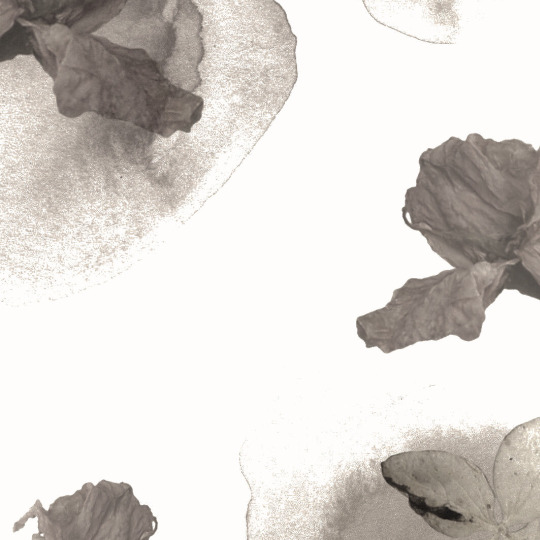
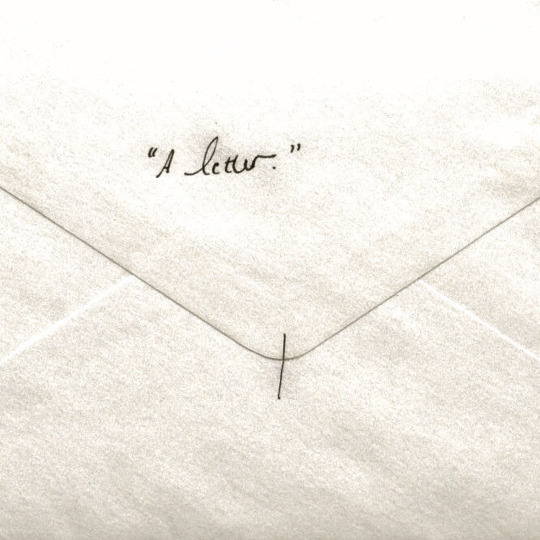

pile one pile two pile three

how to choose a pile . . . choose whichever you feel drawn to or ask your guides to guide your eyes to the one that is meant for you! ᡣ𐭩
— ⭑.ᐟ before we start I would like to say that this pick a card was made for those who were made to believe that God doesn’t love them, or that their existence is a sin. so if anyone wishes to complain about ‘oh but what if I have different beliefs’ then please simply consider that this pick a card is not for you. I am making it for those who were unjustly hurt. not proof read.

pile one : - coffee stain !
𐙚 : judgment reversed, ace of wands reversed, hermit reversed, two of swords, the devil
bottom of the deck: ace of cups
♡ ⢷why He loves you
You are genuinely not a judgemental person, at all. Even if someone is judged by the masses you are someone that does the ‘investigation’ of the situation yourself and then decide if the person actually deserves to be hated or not.
Even when it comes to unconventional things that other people would judge for, you simply do not. You always do your best to understand where the other person is coming from, and most importantly what are they going through. Especially emotionally, you try to see it from their perspective and not from someone that’s an outsider perspective in that situation, whatever it might be. That only comes second, third and so on. You are just someone very nurturing and smart, a person who walks their own way of clarity rather than blindly following the masses.
You are someone that is hard to influence, but rather than this making you unfriendly, it has the opposite effect on you. This quality of yours makes you very friendly and makes people have trust in you.
You are mature and can meet good people because you don’t let judgement fall in the way of you making good connections. Rather, you aim to understand everyone as much as possible.
You are also someone that is very responsible. When you make mistakes rather than running away from them and denying what had happened in the past you stand on your feet and strive to make it right. To create a better future.
This is something that is very honourable about you, something that is admirable.
♡ ⢷personal message
You don’t have to be religious in order to follow the words of God or what’s in your heart. Neither do you have to be religious in order to be considered a good person.
You are just you, and that’s enough.
You are good as you are, with your flaws, with your strengths and with your history. Don’t feel like you have to put on a show in order to be accepted. By this, I just mean that your existence is not a sin. What happened to you in the past is not a sin either, and don’t shame yourself for your normal human desires. Especially if you know it’s not your fault.
‘Picture perfect’ is picture perfect exactly because it’s not reality. Consider it an illusion if you wish.
— ✮⋆˙ someone in this pile is biologically a guy! , hey ya! - outkast , used to be a player , plush animals , bells , bunnies , wooden house , unfortunate childhood , growing up in poverty and actually managing to have a better life , nose bleeds , pink glittery food ? , hate for ants
my beautiful pile one please know that your intrusive thoughts are not you and I see all your efforts to be the best possible version of yourself, to treat yourself and humans with love and respect. you are pretty cool, please don’t beat yourself up. don’t blame yourself for the way other people have hurt you. I am also so sorry if your pile sounds a bit messy, I wrote it at 2AM. thank you for reading.
if you liked my reading please consider checking out my paid readings! there is barely any topic I will say no to and with every penny you are helping me!

pile two : - a letter !
𐙚 : the lovers reversed, five of cups reversed, ten of swords reversed, ace of wands, the hermit, two of cups
bottom of the deck: the star & the empress reversed
♡ ⢷why He loves you
In the past you have made some pretty bad choices. I am not judging, because who didn’t? These could be things that you aren’t necessarily proud of and that you know hurt people. At that time, you didn’t have people’s best interest at heart. You didn’t even care much for it even.
The thing is, this changed. You changed it, without anyone having to tell you to.
You changed it because you didn’t enjoy the person you have become. All by yourself. God, and your guides for that matter, are very very proud of you for that. It could feel a bit unreal to hear that, but regardless, you are reading this pick a card for a reason.
Regardless, you made such a huge progress and became someone that you can be proud of. You are doing so well, there is nothing left but to praise you for how far you have become.
There was genuinely such a huge tower moment in your life which helped you become the person that you are today, one that helped you evolve and have people’s best interest in your heart. Not from a people pleasing stand point either, rather, you look at everyone as human and as crazy as it might sound this isn’t a quality many people have.
Rather than seeing people as strangers, obstacles or just an option to pass time with you have become much more empathetic and have way more emotional depth than what you used to have.
This has helped you and other people heal as well, it’s truly adorable. You have every right to be proud of yourself!
♡ ⢷personal message
The past is the past and the present is the present.
People change and this includes you. Don’t give yourself a hard time over things that no longer matter, or no longer can he helped.
Today, you are a just, wonderful and kind person. Someone that gives their all in everything they do, someone who does things with all their might. A person that is doing their best, every single day, even at times where they don’t want to. - It’s not the bare minimum, this is a very wholesome and just thing of you to do. Don’t under-appreciate your own efforts in life. You are doing so much, while getting so little and you are so strong for continuing to stand even though you feel like giving up at times.
You are doing so well, and I hope you will be able to see that.
— ✮⋆˙ zuko from atla , mha , break stuff - limp bizkits , smiley - yena ft bibi , ear ringing , silver jewellery , crying at night ? , porcelain dolls , grandma , beauty and the beast rose , swarovski princess dolls , blood , red lip tint , being distracted , recently finding out something important about yourself
bad people don’t worry about being bad. I know impostor syndrome can be hard, but you are doing so well! the past doesn’t define you but your efforts of self improvement do! thank you for reading. 🫶🏻
if you liked my reading please consider checking out my paid readings! there is barely any topic I will say no to and with every penny you are helping me!

pile three : - the sea !
𐙚 : knight of wands reversed, the devil, three of swords reversed, nine of pentacles reversed, seven of swords reversed, ace of swords, ten of swords
bottom of the deck: queen of pentacles reversed
♡ ⢷why He loves you
Alright my beautiful pile three, I see your struggles. You have happened to be born into and grow up in an environment that doesn’t serve you any right. One that doesn’t align with your soul and keeps making you go through hardships.
Your family members are not necessarily people who always have your best interest at heart, and even if they do they don’t always succeed in showing you that.
They are much different from you, and even though you don’t necessarily deem yourself as perfect you know they are at times toxic even if they try to include you in things, try to make you feel good in your skin and so on. You, essentially are the black sheep of your family. Not because you try to stand out, not because you cause trouble on purpose but because you try to not make the mistakes that they do.
Being born into a family which you can love is a privilege, and I do think you got to understand that from a very young age even if not everyone in this pile hates their family you don’t always like them despite loving them. - Ironic, that could be something that people who chose this pile heard growing up. -
So, at many times you have felt lonely.
Despite this, you are doing your best. Some of you were at times severely mistreated, tricked into things or perhaps share wounds you genuinely never want to open up about.
Regardless of this, you don’t seek revenge. You don’t aim to hurt people. If you dislike someone you keep your distance, and focus on your own life.
On having good goals, good morals, being kind to strangers, being kind to family and being a good person overall.
Sure, sometimes you do get annoyed, quite a lot at times even, but you do your best to not react out of harsh and negative emotions, to not lash out on people. You know how it feels and don’t wish to inflict such negative kinds of emotions on people. So everyday, you do your best to don’t.
♡ ⢷personal message
Your surroundings don’t define you as a person, being the one to stand out doesn’t mean there is anything wrong with you.
Sometimes you are just meant to stand out, to create differences, to be the foundation for a better future.
For yourself and those who are important to you.
If you can’t be, that’s fine. The world doesn’t rely on you, don’t overwhelm yourself if you believe that you deserve better. The world is give and take, you cannot just give and give and give without receiving anything back.
Being a giver is alright, and having a forgiving heart is beautiful, but you cannot sacrifice your well being just to please people.
— ✮⋆˙ ‘I just wanna be one of your girls tonight one of your girls tonight’ , apple watch , an actual apple , lana del rey , ‘back to black’ , late night talks , ‘bye guys! hi ladies!’ , soobin from txt , dipper pines , weird food combos - peanut butter with pickles … ? whatever makes you feel happy my pile 3 - , back scratching , long nails , poverty , gangs (?)
I can definitely resonate with you my beautiful pile three, please just know that beautiful things await you. Like genuinely, you will have so many good things in life which you didn’t even previously think about or consider before. I hope you will be able to find so much happiness my little lamb. thank you for reading.
if you liked my reading please consider checking out my paid readings! there is barely any topic I will say no to and with every penny you are helping me!
#tarot community#tarot blog#tarot#tarot reading#spirituality#free tarot#tarotblr#astroblr#free tarot reading#pick a card#paid readings#pick a picture#daily tarot#tarot decks#tarot cards#astro community#astrology#pick a pile#pick a photo#christianity#christian faith#God#remember hating on me for this pac is genuinely childish !
414 notes
·
View notes
Text
Having it-girl nakshatras (Mars, Mercury, sometimes Moon) is not enough to have thee aura and fashion style to make one stand out– of course. I wondered what other placements back up the effect. Definitely Mercury influence which can make one have a keen eye for details and be crafty with their style / brand... curating something unique and outstanding. The trendsetting and popularity aspect definitely goes to Mars as this planet is dominant and daring to take risks as it is provocative. Mars is very strategic, so climbing up the ladder can only be natural. And then Venus is very important. Very obvious why, as beauty and quality plays a role in the whole it-girl factor. Venus can make one know how to appeal to the masses through art and aesthetics that are distinctly high quality. Along with Mars, Venus influenced natives can master in appealing to the masses by satisfying their senses.
I believe that having these specific planets aspecting each other is very impactful when talking about being an it-girl—fashion icon. (Prominent aspects such as conjunction, opposition, squaring and maybe even trining to a lesser extent).
For example, Sabrina Carpenter doesn't have an outstanding it-girl nakshatra in her top placements. But she does have a strong Mercury-Mars aspect (opposition).

Similarly, Megan Thee Stallion, although she does have Dhanistha Sun, also has a strong Mercury-Mars aspect (opposition).
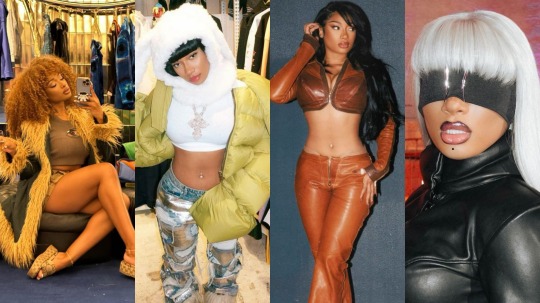
And then you have Bella Hadid. She not only has Moon conjunct Venus, but also Venus in the 1H which magnifies Venus even more. And even better, she has Mercury in the 2H. With exalted Mercury in Virgo. The 2H is ruled by Venus, and it literally supports the themes of the 1H. In the context of this post; it is associated with one's face, self esteem, and aesthetic. And that is where her Mercury sits. Not only that, she has Rahu conjunct Mercury which amplifies her Mercurial influence and 2nd house tenfold.
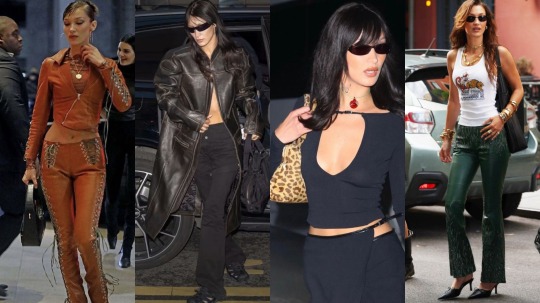
Her sister, Gigi Hadid – although not particularly known for her fashion sense – also has Mercurial influence. I still think she's worth mentioning because she knew how to tap into a specific image of herself during her peak. She has Mercury in the 1H, with a strong Mercury-Mars aspect (square). She also has exalted Venus in Pisces in the 12H.

Now Rihanna is a known fashion icon. She has exalted Venus in Pisces, and more importantly she has it in the 1H. AND with Moon conjunct Venus. Already, intense Venus energy much like Bella Hadid. More importantly, she has a strong Mars-Venus aspect (square). We see that in how she's authentically herself and very bold.
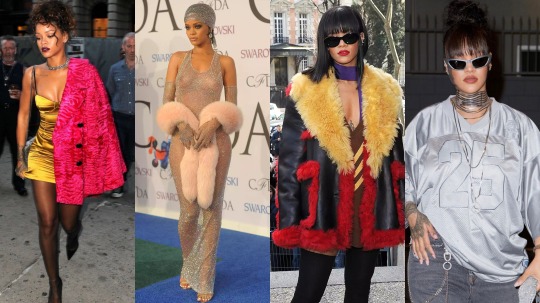
Tyla is an up and coming fashion icon already! And she has Mercury conjunct Venus! We can already tell that most of her visuals are meant to be memorable and influential just from this conjunction alone.

Kylie Jenner, who literally has Mercury conjunct Venus! And also Moon conjunct Mars, which amplifies her Mars influence. The fact that Rahu is conjunct Mercury-Venus exaggerates these aspects even more.
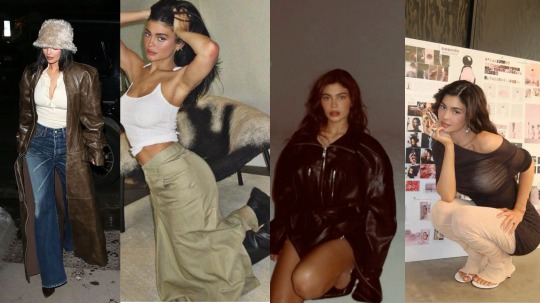
Sofia Richie, who started the clean-girl aesthetic trend, also has her Mercury conjunct Venus. Actually she has a full on Mercury-Venus-Mars conjunction! Of course she was a trendsetter in her peak.

Anya Taylor-Joy is one of the few actresses I can name that are very distinct about their looks and it's been so interesting to watch her transform her red carpet looks. An absolutely ethereal being and I know for a fact she's intentional about her visuals. Since she said she's a Taurus Ascendant in an interview, that means she's likely a sidereal Aries Ascendant. Which would put her Mercury in the 1H! And if she turns out to be a sidereal Taurus Ascendant, her Mercury would be in the 2H. And again, 2H is related to the aesthetics as it supports the 1H. Now more importantly she also has Moon conjunct Mars!
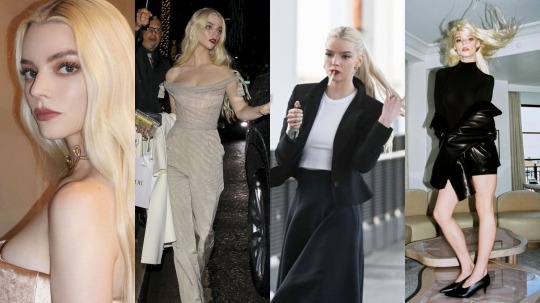
And then you have Zendaya, another fashion icon who happens to be an actress. And of course, she has a strong Mercury-Venus aspect (square)! AND RAHU CONJUNCT MERCURY. Whatever planet Rahu is conjunct with, the themes of that planet are exaggerated. Zendaya has a very keen eye and you can see her passion for fashion in her Mercury-Venus aspect. She may never want to not serve ever again.
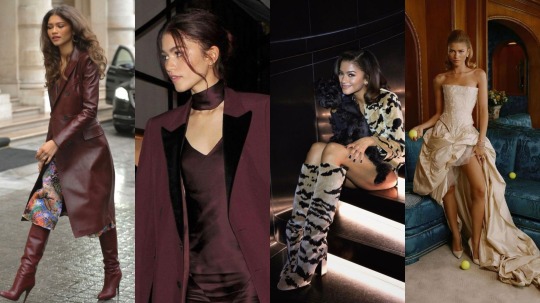
Justine Skye has Mercury conjunct Mars.
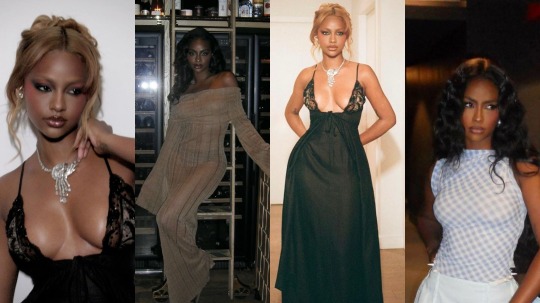
Dua Lipa, she's another one who has Mercury conjunct Venus!
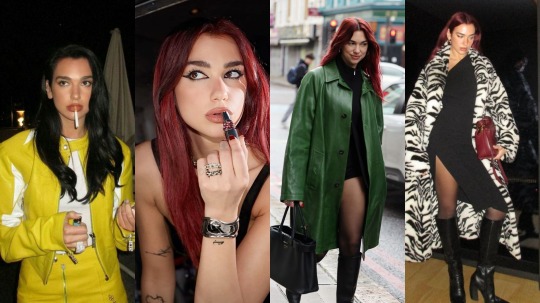
Kim Kardashian has Mars in the 1H. And a strong Venus-Mars aspect (square).
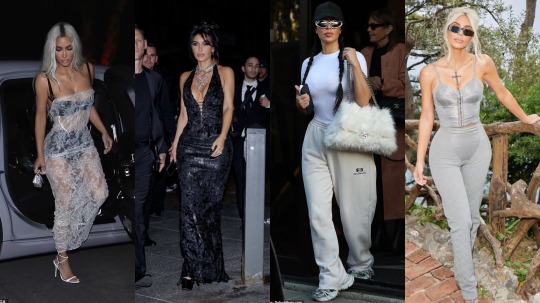
Doja Cat has her Venus in the 1H. And exalted Mercury in Virgo.
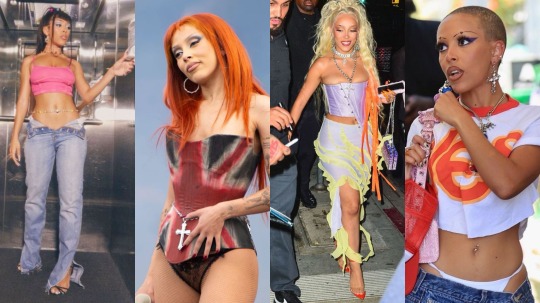
Jennie Kim (Blackpink), gotta be the most well known kpop it-girl. She literally has Mars conjunct Mercury! While her member, Lisa, who is also deemed an icon I believe, has her Mercury conjunct Venus!

Okay these placements are getting predictable at this point. Because then it's Jang Wonyoung from IVE, who has Mercury conjunct Mars.
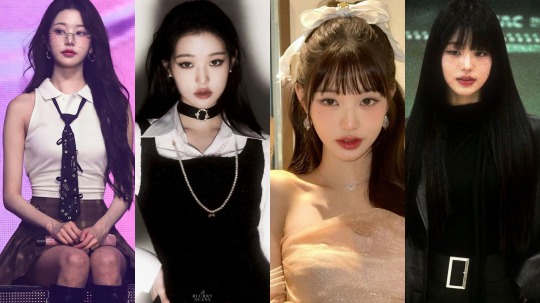
Alexa Demie is the last fashion icon actress I can think of right now. Predicably, she has Mercury conjunct Venus. (Her dark, alluring aesthetic is very much due to her Ketu in the 1H.)
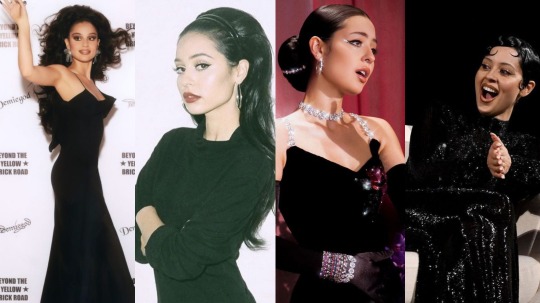
Last, but certainly NOT least, you have Aaliyah! Whose fashion statements continue to be influential till this day! She had Mars in the 1H.
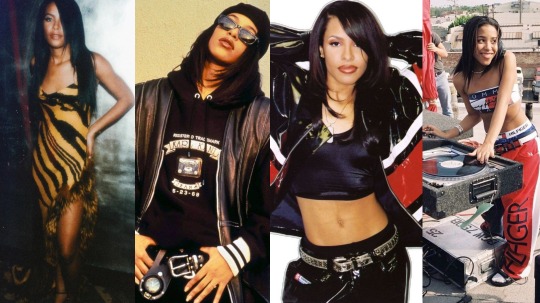
I might continue this in a thread (check the reblogs of this post for more 🧵) when I find more. I simply started this out of curiosity because I was wondering how those who didn't have it-girl nakshatras could still dominate the trends and how some of those who had such nakshatras weren't able to utilize their potential. So of course it's all about the chart, not everything is drawn up to the top 3 placements.
#vedic astrology#mars#venus#mercury#sidereal astrology#astrology#astro observations#astrology observations#pisces#virgo
368 notes
·
View notes
Text
Why I Dislike PbtA Games, and How Eureka: Investigative Urban Fantasy is Their Opposite

@tender-curiosities

It is no secret that I hate PbtA games.
Though due to a recent misunderstanding regarding another post, I’m going to preface this post by saying that this is going to be a very opinionated post and
I do not seriously think that PbtA games are inherently bad, though I may sometimes joke about this.
While I do often question the taste of people who make and play PbtA hacks, I do not think poorly of their moral character.
While I am going to call for PbtA to be used less as a base for games in the future, I’m not saying that the whole system and all games based on it should be destructified. It’s good for what it’s good for, but unless you’re doing that, I really think you should use something else.
Now that that is out of the way, here’s what I have to say about it.
My first experiences with PbtA games were pretty rough. Monster of the Week was not the first, but it was one of the first ‘indie’ TTRPGs I played after having previously played mostly only D&D3.5e and 5e. I really appreciated that the use of 2D6 over a D20 meant that the dice results would be more predictable, and I really liked the various “classes” I was seeing. (At this time, I didn’t really understand that they weren’t really “classes” at all, though I think I can be forgiven for this because many people, even people who like PbtA games, still talk like “classes” and “playbooks” are interchangeable.)
I was very enthusiastic to play, until it came time to start actually “making” a character, and found that I couldn’t “make” a character. I wanted to make a nuanced, three-dimensional PC who was simultaneously stereotype-affirming and stereotype-defying, with a unique backstory and dynamic with the other characters—but when I went to actually fill out the character sheet for basically any “class”, I found that most of the backstory and most of the personality for my character was being set for me by the playbook. It felt like the only thing about the character I really had a say in was their name, and that two PCs of the same playbook would actually turn out to be almost identical characters. At the time, I thought this was very restrictive and very bad design.
Later, now that I understand the design intent behind it, I still think of it as very restrictive, but I think of it as very bad design for me, not inherently bad.
When I play a TTRPG, I want more freedom in who my PC is. That doesn’t mean I want less rules, in fact having more rules can often increase freedom, but that’s a different post. I want to create original, unique characters, that I won’t see anywhere else. If it’s a class-based system, I want that class to barely touch the details of my character’s backstory or personality, so that I can come up with something original and engaging for why and how this “Fighter” fights. This means that two level-1 Fighters, despite having almost the same mechanical abilities, will potentially be very different people.
PbtA games don’t let you do that. In a lot of PbtA games, you’re not playing your own original character, you’re playing someone else’s character, that every other player that has picked up the same playbook before you has played. It’s more like “character select” than “character creation.” I think I could liken it to playing Mass Effect or The Witcher. Every player may pick a few different dialogue choices in those games that change the story, but we’re still all playing Shepherd or Geralt. No one is going to experience a new never-before-seen story in Mass Effect or The Witcher, which is very much a factor of them being video games and not TTRPGs, and therefore limited to the amount of code, writing, and voice-acting that can go into them.
This anonymous asker who sent a message to @thydungeongal seems to feel pretty similarly to me about PbtA games, and @thydungeongal's response is a very good response about how people find this appealing.
I have more respect for PbtA now than I did, but I still don't like it because to me it seems to play so much against what I consider to be the strengths of TTRPGs as a medium, much like how video games like The Last of Us and David Cage games play against the strengths of the medium of video games, and I will never like it. But other people clearly do, so to each their own.
Then another reason I don’t like it is because I think it’s oversaturating the TTRPG space. I’ve referred to PbtA before as “indie D&D5e”, and i do think that’s a reasonable comparison, because in much the same way that you always hear “D&D5e is a system that can do everything”, I think a lot of people seem to be under the impression that the PbtA system is a system that can do anything. It’s kinda the système du jour for indie TTRPGs right now, and many iterations of it make it clear that many designers do not consider how PbtA differs from more traditional TTRPGs, and how it is specialized for different types of TTRPG gameplay. Just like how I feel PbtA isn’t playing to certain important strengths of TTRPGs, I think that many—maybe even most—PbtA hacks don’t play to the strengths of PbtA. But this isn’t really PbtA’s fault, that comes down to any individual indie TTRPG developer on a case-by-case basis. And the cure for that is something I’m always saying: If you are going to be a writer, you have got to read lots of books. If you are going to be a director, you have got to watch lots of movies. If you are going to be a video game developer, you have got to play lots of video games. And if you are going to be a TTRPG designer, you have got to read and play lots of TTRPGs. That and you have to understand that TTRPGs are specialized. Even "agnostic" systems like PbtA are somewhat specialized, and therefore might really not be a great fit for the game you’re trying to make.
That and, to get more subjective again, there’s like an ocean of them, and I don’t even like the ones that are actually good.

Now that I’ve talked about how I don’t like PbtA games, I’m gonna talk about a game I do like: Eureka: Investigative Urban Fantasy. Obviously, I like it because I’m the lead writer for it, but I would also like it even if I wasn’t the lead writer for it, because it’s just my kinda game. Eureka is the opposite of a PbtA game. I wrote it to play to what I feel are the strengths of the TTRPG medium.
Eureka’s character creation uses personality traits as a mechanical element of the character, but it does so in a deliberately freeform way. You build your character’s personality out of a list of traits, so who your character is is very much linked to what your character can do, but we aren’t just handing you a pre-made character.
Eureka is designed to incentivize organic decision-making by the PCs, most often by the mechanics of the game mirroring the world they live in. Every mechanic aims to create situations wherein “what will the PC do next?” is a question whose answer can be predicted - it doesn’t need to be ordained by a playbook.
One of my favorite examples of this is, rather than a “Fear Check” forcing the PC to run away if they fail, or “Run Away from Danger” being a “Move” on their character sheet, Eureka opts for the Composure mechanic. The really short version is that one of the main things that lowers a PC’s Composure is encountering scary stuff, and the lower a PC’s Composure, the more likely they are to fail skill checks, and the more likely they are to fail skill checks, well, the less brave they and their player probably feel about them standing up to this scary monster. So if the PC has low Composure, they are more likely to choose to run away. The lower their Composure, the better idea that will seem.
This system really really shines when it comes to monster PCs in Eureka. Most monsters benefit a lot more from having high Composure, but have fewer ways to restore Composure than mundane PCs. Their main way to restore their Composure is by eating people. The rulebook never says “your monster PC has to eat people”, but more likely than not, they’re going to be organically steered towards that by the game and world itself. Sure, they could decide to be “one of the good ones”, and just never eat people, just like you reading this could decide to stop eating food. You technically could, but when your body starts to fail, how long would you? (This is a big part of the themes of Eureka and what it has to say about crime, disability, mental illness, and evil. People don’t just arbitrarily do bad things, it is often their circumstances that leads them down that path until they see little choice for themselves in that matter, and “harmful” people are still just as deserving of life as people who “aren’t harmful”, but that really deserves its own post.)
It has been said that Eureka: Investigative Urban Fantasy actually arrives at much the same end as the PbtA game Monsterhearts, and I actually don’t disagree, but it gets there from an entirely different starting point and direction. The monster PCs in Eureka are very likely to eat people and cause drama, but it won’t be because they have “Eat People and Cause Drama” as a “Move” on their character sheet.
Monsters in Eureka have a lot of abilities, which they can use to solve (and create) problems as the emergent story emerges organically.
(Oh and Eureka is about adult investigators investigating mysteries, and sometimes those investigators are monsters, not about monster kids in high school, to be clear. The same “end” that Eureka and Monsterhearts reach is that of the monsters being prone to cause problems and drama due to the fact that they are monsters, though this isn’t the sole point of Eureka, just one element of it.)
You can pick up the free shareware version of this game from the download link on our website, or the full version for $5 from our Patreon.
And don’t forget, Eureka is fundraising on Kickstarter starting on April 10th, 2024! We need your support there most of all, to make sure we hit our goals and can afford to make the best version of Eureka we can make!
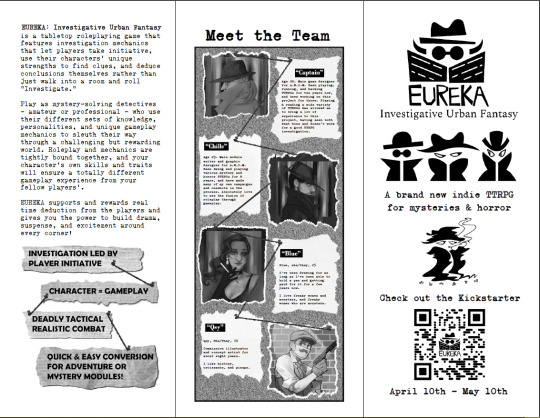
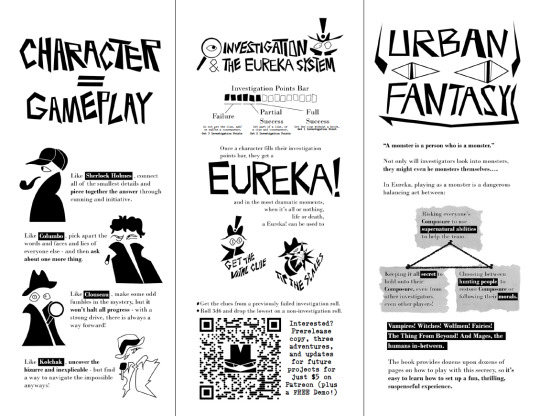
Interested in branching out but can’t get your group to play anything but D&D5e? Join us at the A.N.I.M. TTRPG Book Club, where we nominate, vote on, and play indie TTRPGs, all organized by our team with no strict schedule requirement! Here's the invite link! See you there!
We also have merchandise.

#eureka: investigative urban fantasy#ttrpg#rpg#roleplaying#eureka#tabletop#monsters#coc#allied forces#monsterhearts#pbta#powered by the apocalypse#motw#monster of the week#motw ttrpg#motw character#d&d 5e#d&d#dungeons and dragons#dnd#dnd5e#d&d5e#fighter#indie#indiegames#indie game#indie games#indie designer#ttrpg design#ttrpg community
380 notes
·
View notes
Text

Mass Effect galaxy map
(For the Rhi Shepard universe)
I've been writing, if by 'writing' one means 'making a new galaxy map to use as a reference, because I'm too picky.'
I copied some symbology from Droot1986's excellent galaxy map. I also used Engorn's map as a reference, but ultimately the clusters and connections are based on the wiki. All systems within a cluster are listed, with inhabited planets in parentheses.
(...yeah, I should probably make a legend, but I only made it for my reference, so).
Features/changes
The relay in the Sol system only connects to Arcturus. This is how it's supposed to work in canon lore; Arcturus is important because it's a gateway system, while Sol is a dead end.
(Also, Sol is now in basically the right place compared to the underlying artist's impression of the milky way. Thank you NASA.)
Batarian's now have some space of their own, because lumping all batarian space into the human Systems Alliance was just BEGGING for a war. Like, WTF. Their government is flat out evil but that doesn't mean we just get to say their planets are ours now.
Combined inner and outer council space because idgaf.
There's a new, boringly named relay between Kite's Nest, Petra, and Exodus, because I needed one in chapter 14.
If a cluster had written lore about where it was in the galaxy, I tried to reflect that — so Styx Theta, Hawking Eta, and the Pangea Expanse are all close to the galactic core, Sentry Omega is on a political border, etc. Otherwise, I adjusted location to make the relay routes clearer. (Also I wanted the giant hub that is Omega to be almost opposite the Serpent Nebula and the Citadel)..
I imagine that there are actually a LOT more mapped clusters in Council Space than we see; they were just never relevant to the game. If not, the vaunted 'all relays lead to the Citadel' reaper web is just flat out wrong. Omega has more connections, and quite a few other clusters have as many. If there are more inhabited clusters in Citadel Space it also makes the veritable explosion of humanity look a little less ridiculous. (Seriously, humans have been on the galactic scene for thirty years. LOOK at how far we've gone. Council races are right to be freakin' terrified, the Sol system was like one of those plants with exploding seed pods where you bump it and POOF now they're EVERYWHERE). So let's assume the rest of the galaxy is as cluttered as Systems Alliance space, it's just not been relevant to our anthropocentric bag of dicks worldview.
Anyway. What the fuck is even up with the Attican Traverse?
#Mass Effect#no tumblr I don't want to tag it 'massive breasts'#good suggestion though#Mass Effect lore#Fire the headcan(n)on#Mass Effect reference#btw I'm happy to share BIG versions of the file if anyone wants#don't really consider this art just a reference work cribbed from others#it IS subject to change tho#sometimes authors just need another relay system in there#I just needed all the important planets and routes and what not in one place#and then things happened
142 notes
·
View notes
Note
Hello Dapper. I don’t really expect too much about this, but do you have any ideas for Wargs? They have an interesting relationship with goblins and are weird in that they’re essentially sapient wolf monsters, but I don’t think they’re ever really used that creatively.
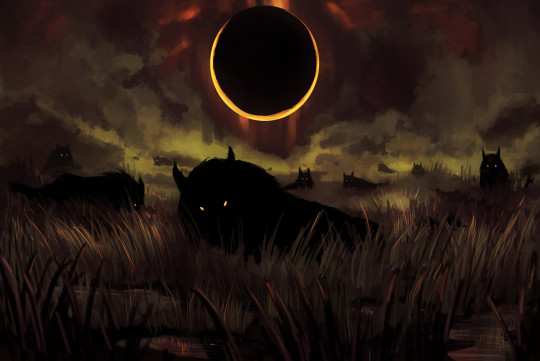
Monsters Reimagined: Wargs, wolf panics, and the Economics of Lupophobia
While the surface level answer is pretty simple (warg is a conversion of varger, an old Norse way to refer to mythological wolves like Fenrir) there's actually a surprising amount of material to drill into here on the topic of sapient wolf monsters, especially for someone like me who has a interest in moral panics and mass hysteria events. Wolves were effectively a boogyman for pre-industrial societies, a deep seated generational fear that we only recognize today through cultural relics like the big bad wolf or boy who cried wolf.
TLDR: If you want to do something interesting with wargs beyond just "wolves that talk" I'd advise playing to their folk / fairytale roots. They're creatures of embodied dread, drawn from the stuff of the feywild to sow fear among those who would travel off the path or too close to the wilderness. This lets you tell interesting stories about how the party/major characters respond to fear: Does fear of being attacked in the dark drive the party to make risky decisions that might endanger their quest? How do the villagers react when the wolves are very literally at the door, demanding just one of their neighbours as a meal in exchange for safety?
I'd also advise getting weirder with a warg's powers, playing into that fear of the unknown by doing unexpected things. The party can fight off a pack of wolves, sure, but what does it mean when the lead wolf rips off the bard's shadow and takes off into the night?
Background: If you want a window into the headspace of wolf-panic, think about the neigh omnipresent fear of sharks created by the Jaws franchise. Children who have never seen the movie, let alone seen a shark in person can become irrationally afraid of getting into deep water because they've absorbed the pervasive cultural phobia, which goes onto shape environmental policy as sharks are overhunted or killed out of spite for their perceived threat.
So it was for wolves, even after they were largely hunted to near extinction by medieval and postmedieval societies, the fear of them was so ingrained into cultural traditions that wolf and werewolf panics were a thing that went hand in hand with witchtrails. France had a country wide one as late as the 1760s and the movie based on it ended up inspiring Bloodborne. Alternatively look at the anti-wolf efforts during the colonization of the Americas, right up to the opposition to reintroducing wolves back to Yellowstone park.
On that note (and because we can't have a Monsters Reimagined without some kind of class analysis), lets talk about how these fears are propagated: On many levels it makes sense for everyday people to be afraid of wolves, they're a hunting species that can absolutely pose a danger to us, and when you're living or travelling outside the protection of a settlement you really are vulnerable to a coordinated pack of carnivores running you down.
However, the primary threat that wolves pose to humans isn't predation, it's property damage, specifically in how they kill livestock. While we can talk about individual farmsteads beset by beasts, in reality the herds that wolves were most likely to prey upon belonged to the landowning classes, powerful people who had a profit incentive in seeing wolves driven off or exterminated. This is where you get bounties on dead wolves, not just paying for the value of the hide but actively rewarding people for going out and killing as many wolves as possible to the point of it becoming a profession. This practice has existed for MILLENIA and is still active today, primarily in places where big agriculture influences governments.
It seems incidental at first but then you realize that it fits the model of just about every other kind of cultural panic: widespread ignorance and fear that just so happens to mobilize the populace in a way that financially benefits a select few. You can see the same thing happening today in england with badgers of all things, which have been identified with the local dairy industry as a threat to their herds. This is not only led them to petition the government to cull the badger population, but to put out anti-badger propaganda, eventually turning it into a culture war issure to the point where conservative mouthpieces like Jeremy Clarkson openly encourages killing and gassing badgers on sight.
Returning to the land of fantasy for now: I think it's worth taking the idea of the warg and mixing it with a few other "black dog" cultural archetypes, which can also include the creatures like the shuck or church grimm. In this instance the warg is a sort of curse made manifest, the fear of a haunted place given literal teeth. People who transgress into these forbidden spaces find themselves pursued by a manifestation that dogs them till they're exhausted and vulnerable, much like a wolf harrying its prey.
The bhargest is also of special interest here, considering how I like to relate goblins back to the feywild. You could easily see bhargests as agents of fey that feed on human fear, leading a pack of goblins or hobs that occupy the desolate lands they've called to haunt. My version of Maglubiyet would also delight in employing such creatures as his emissaries.
Going back to the vargr/ Norse mythology angle, it's interesting that most of the wolves that show up are destined to devour something, whether it be a god or celestial certanty like the moon and sun. It's like the concept of an inevitable chase is so fundimental to what a wolf IS that it became a theme of ragnarok's inevitable certantly. Consider having certan packs of wargs be offspring of some fenrir style god eater, beasts of forboding doom who's mere presence is an omen of ill times.
Alternatively, if you wanted to play on the big bad wolf angle, give wargs the ability to take on flimsy human disguises, all the better to get close to their pray and sow fear among the townsfolk. Historical wolf panics after all are not all that different than serial killer panics, and it'd be a fun twist on a traditional werewolf adventure to have the party on a creature that didn't play by the usual lycanthropic rules.
Artsource
214 notes
·
View notes
Note
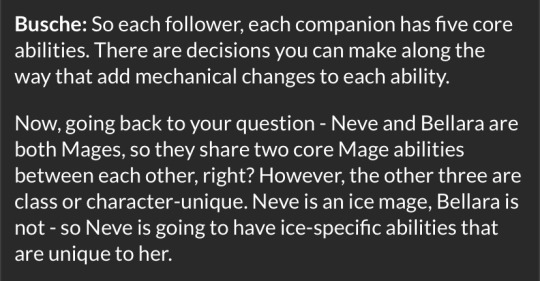
RPGsite did an interview with Corinne Busche and Bellara is confirmed to be a mage????? SO EXCITED
hello! ◕‿◕ !! cool! thankyou for sending this in. :D
Text reads:
"Busche: So each follower, each companion has five core abilities. There are decisions you can make along the way that add mechanical changes to each ability. Now, going back to your question - Neve and Bellara are both Mages, so they share two core Mage abilities between each other, right? However, the other three are class or character-unique. Neve is an ice mage, Bellara is not - so Neve is going to have ice-specific abilities that are unique to her."
Other notes from this interview, which is titled "Dragon Age: The Veilguard’s director talks RPG systems, skill trees, and being inspired by Final Fantasy XII"
"After seeing the hands-off demo, we got a chance to briefly chat with Dragon Age: The Veilguard director Corinne Busche - who right away gushes about being a real RPG system nerd"
Progression is very deep
Where Mass Effect is an ARPG which big action and 'minor RPG', DA:TV is almost the total opposite of that
The skill tree is unlocked a few missions in
Every level up you get skill points
The skill tree is huge and bespoke to Rook's class
The skill tree is almost like a gigantic spider-web visually.
(Sounds like the skill tree wire-frame they shared in a blog in February 2023..)
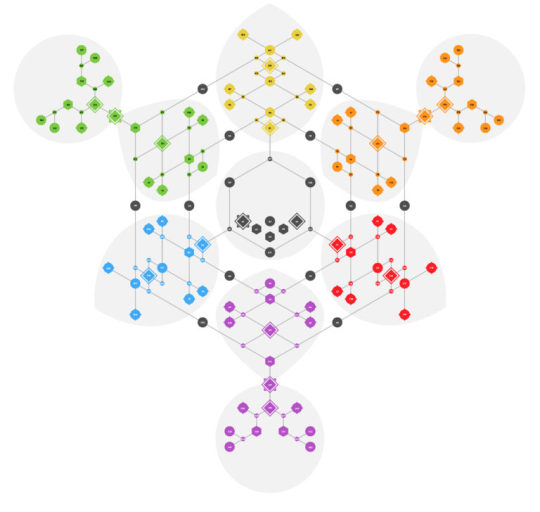
[source]
If Rook is for example a mage, at the very center of this is the core of the "Mage kit"
This aspect of gameplay was heavily influenced by Final Fantasy X, especially FF XII. Corrine compares it to the Sphere Grid
There is ability selection, passives, traits
Each of the specs is on the outer edges of the grid. (Fel note: Referring to the three outer bubbles in the web above? :> there are 3 specs for each class)
You start at the center and work out, in the direction you want
The specs are shown in CC like the classes
In addition to the specs the web is divided into 3 sections, for example the Warrior's are a defense-oriented, weapons-oriented, ability-oriented. "So what you might do trying to get to, say, the Reaper specialization is go… Rather than going up through defense into Reaper, I’m going to go down through Ability into Reaper" (Fel note: other outlets reported the 3 specs for Warrior are Reaper, Champion, Slayer)
Skills are unique per class
Every level you get a skill point
There are other site activities to get skill points
Skill points can be refunded
Level cap is 50
You can 'enter' the spec part of the grid about mid-game
Party members all have unique skill trees, these are organized around their individual abilities
Party member skill trees are organized around their individual abilities. "So when you unlock their full suite of abilities, each one has a skill tree full of choices where you can get autonomous usage, or lower the cooldowns, or add additional effects to the ability"
Each companion has 5 core abilities. Decisions you make along the way add mechanical changes to each
As we saw in the gameplay reveal video, Neve is an ice mage
Bellara is also a mage
Neve and Bellara share 2 core Mage abilities, however the other 3 are class or character-unique i.e. Neve will have ice-specific abilities unique to her
Elements are a big factor in combat
[source]
#dragon age: the veilguard#dragon age: dreadwolf#dragon age 4#the dread wolf rises#da4#dragon age#bioware#video games#notpietromaximoff#long post#longpost#mjs mailbag#mass effect#thanku also to doggiesnores and dreadfutures and valleyofsand-blog who both also sent this article to me :D
359 notes
·
View notes
Note
So. Hear 5. Nika. Loony Tunes Luffy, if you will. Tell us your thoughts on him and any potential meta? 👀 I’ve been aching to hear it from you since we first saw him go Full Silly Boy.
it's hard to answer this, because i have so many thoughts. i'm just going to try and start from the biggest points and move down.
i like gear five a lot, and i think this development feels very appropriate as a culmination of both luffy's character and the themes of one piece as a whole because of how it interacts with three extremely dominant motifs that have reoccurred throughout the story: freedom, laughter, and the sun.
from the very beginning of the story, luffy has acted, in small ways and big, as an agent of complete freedom. from his first meeting with coby to his breakout at impel down to the liberation of wano, what luffy does is destroy systems that control and oppress, if only because they are in his way. every strawhat is somehow trapped and held back from pursuing their own dreams when they meet luffy, and he frees them all, along with hundreds of others along the way, whether he's inspiring shirahoshi to venture outside or crushing yamato's manacles. his talent for this has always seemed almost preternatural.
luffy is not necessarily a benevolent person; he doesn't care much about helping people in the abstract. he's selfish. he values freedom for freedom's own sake, not because of any greater moral convictions. he doesn't think much about the negative knock-on effects of things like causing a mass breakout at impel down, and he doesn't really go around seeking out downtrodden and oppressed people to free out of a charitable or selfless instinct, nor does he really do anything because it's the right thing to do. he's dismissive of the idea that he might be a hero.
but because he is a completely uncontrollable free agent, and he doesn't really want anything but for himself and everyone he cares about to be completely free, he constantly collides with the systems of oppression that control his world, and when those collisions happen, it is the systems that fail, time and time again, because oppressive systems always do eventually. they can't withstand the light of day. and because he lives completely confidently and unapologetically, he is constantly inspiring others to do the same.
so by the time we are told about nika for the first time, we already know that what nika is said to do is what we've seen luffy doing for more than a thousand chapters: he frees people, and inspires them, and makes them laugh.
i also find luffy-as-nika to be very interesting and thematically appropriate when positioned in opposition to the various antagonists in one piece who have declared themselves to be gods, frequently some of its most tyrannical and oppressive villains- enel, the celestial dragons, doflamingo. all enslave and imprison people, robbing them of their freedom.
nika is a god of slaves, and a creature of liberation. the natural enemy, as rosinante might say, of that sort of megalomaniacal 'god.'
one piece has also consistently connected the theme of freedom, as embodied through luffy, with the sun since very early on. the sun pirates, former slaves, used the symbol of the sun to wipe away the brand of the celestial dragons. (and aren't i curious to know what jinbei might know about nika- he never did answer who's who's question about it.) the fishmen more broadly view the sun as something to be reached when they are truly free. on wano, the coming dawn is understood as the coming liberation. impel down and the florian triangle, places of indefinite imprisonment, are lightless dungeons where the sun doesn't reach. the sun is freedom.
and luffy has always been thoroughly sun associated, from the visual of his hat to his origin on dawn island in the east blue, to his ship, the thousand sunny.
finally, one piece has always placed a great deal of emphasis on smiles and laughter (laugh tale, joy boy, roger laughed, etc)- but that joy must be real. it can't be forced. we're told again and again, through koala, dressrosa's toys, and most obviously the victims of the failed SMILE fruits, that to force someone to smile, denying them the right to cry, is nothing less than an atrocity. people can't be forced to be happy- they should be happy because they're free.
luffy in gear five is laughing nigh-constantly, but it's just because he's having so much fun. unlike the victims of the SMILE fruits, his endless joy is genuine, because in this form, he is completely free- nobody can stop him, and nobody can control him. as he says himself, he can do whatever he wants.
i know that some people felt this moment was in some way a deus ex machina, but it just didn't feel that way to me, because of how well it plays on the story's established themes and trajectory, as well as concepts like devil fruit awakening having been established hundreds of chapters back.
luffy is the sun, the sun is freedom, freedom is joy. i think it makes total sense.
#one piece#jonny answers#op#opmeta#luffy#gear 5#character meta#long post#what are my thoughts on gear 5 you ask. this isnt even all of them.#sun god nika
505 notes
·
View notes
Text
Garp Rant #11543
Because I'm something of a Certified Garp Hater/extremely obsessed with this man, and because Tumblr people seem to like my Garp takes and/or find them extremely pain-inducing, here's another one for funsies! Again, Garp is an incredibly written character and I massively enjoy his moral failings and human shortcomings, hence why I won't shut up about how much he sucks. So we all remember Garp crying in front of Ace during his imprisonment and awaiting his execution, lamenting the fact that his son and grandson could have maybe avoided this horrible horrible fate that awaits them at Marineford if they'd just become good marines like he'd tried to press them into. Every time he says it, he sounds more desperate, sadder, and angrier, like he's experiencing the stages of grief and going through denial, anger bargaining all at once, lashing out at his grandkids for supposedly causing him grief by defying his wishes, or maybe praying or wishing for a world where they could have followed in his footsteps and lived happily ever after. And when Ace hears that again at Impel Down, he says this:
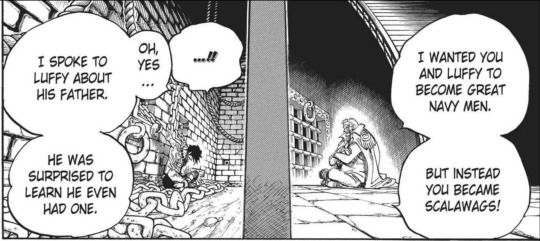

Here's the thing though: Ace is unequivocally correct Garp should, by all rights, know this. He lived through the fallout of Roger's execution. He knew long before that exactly what would happen to Roger's loved ones and anyone the government could get their hands on who'd ever associated with him. Even before they started committing femicides/infanticides in Baterilla trying to end Roger's bloodline, he knew that the Marines were going to target completely innocent people in the name of purging the bloodline and cementing their "victory" over the greatest threat they'd ever faced. He specifically had to smuggle Rouge out of there so she could give birth to Ace, and all the while dozens of families were being brutalized by his peers and having their lives torn apart. That was the cost the Marines were willing to incur to kill a hypothetical infant, and years later, when that very same child is set to be executed, Sengoku goes on a remorseless public tirade about the necessity of killing babies and the horrible trickery and audacity Rouge displayed by dying so that they wouldn't kill her baby too.
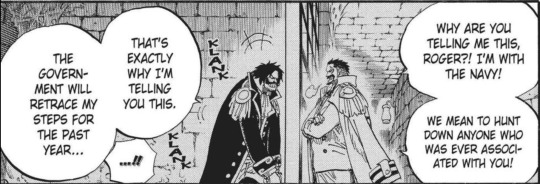
Garp knows every single piece of this information in painful, excruciating detail. He's so horrified by it he feels the need to fulfill this wish of Roger's because he knows blameless people will die. He has Ace raised in secret to protect him from Marines who are figuratively and literally out for his blood. And yet, throughout this boy's childhood, he clings to the notion that maybe, just maybe, the people he knows regularly commit atrocities, who have carried out at least 3 genocides that we know of in Garp's lifetime, who were willing to commit mass infanticide for a woman and child they hadn't verified the existence or identity of at the time, would have accepted him within their ranks and turned a blind eye to that information when it eventually, inevitably surfaced. That Ace can find salvation from the people who stole every loved one he ever had before he was even born, who slaughtered his mother's community and pushed her to her death, and were slavering at the opportunity to kill her. That even though Ace was born in direct opposition to them, has had a target trained on him before he was born, these people who tried so goddamn hard to kill him would surely welcome his presence and not murder him the second they found out if he could just be a compliant model soldier and make himself useful. It's hammered home pretty effectively–especially in the manga– and One Piece has never been known to be subtle in its messaging, but I swear to God I see so many people echoing the notion that Garp's attempts to force his grandchildren into serving the Evil Empire was done because he knew was their only shot at safety from the WG, and I fucking despise this take. Ace saying that he could never be a marine here in Impel Down isn't some young man's rationalization for his (beyond valid) desire not to subscribe to the preset path Garp laid out for him; it's literally the only logical conclusion if you know literally anything about the circumstances of his birth and upbringing, and Garp only thinks that the leopards wouldn't eat Ace's face because he's fucking delusional This in and of itself is extremely telling of how horribly warped Garp's perception of the Navy is, and how deeply he's willing to buy into the Marines and their warped propaganda no matter how many glaring examples he sees throughout his life that counter his worldview, but let's not forget that this applies to Luffy too. This is slightly hairier, in that if Luffy was a) the sort of person who could willingly accept a career in the marines and b) managed to cling really, really tightly to his grandfather's coattails and legacy, there might have been a very, infinitesimally small chance that he could have joined the Navy. The higher ups know that Dragon is Garp's son and therefore Luffy is Dragon's by logical inference, but I could see some AU where Luffy is a fundamentally different person and manages to build himself up in the Navy if not for two things I think warrant examination. It's pretty evident, and Dragon explicitly confirms, that Luffy being known as his son would have put him in incredible danger, only feeling comfortable with acknowledging it and the possibility of actually reuniting with his child after Luffy was both publicly recognized due to factors beyond his control, and proved that he was more than capable of holding his own. But I want to draw attention to this one otherwise pretty silly little gag moment between Garp and Sengoku when they learn that Luffy's broken into Impel Down, and present a theory that's kind of a reach but also not really
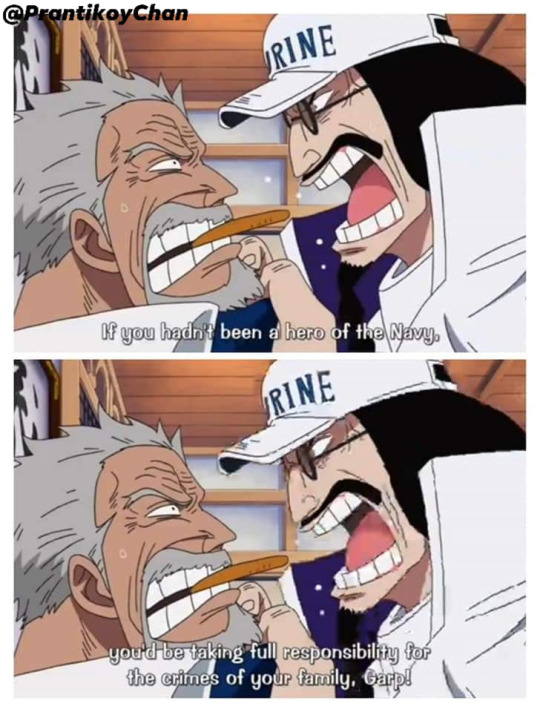
Now the phrasing here kind of interests me, in that it ties back to earlier demonstrated patterns that the Navy uses repeatedly in collective punishment for the families and loved ones of their primary targets. Rouge and Ace barely escaped the mass murders intended for them because of their connection, but Tom was also originally sentenced to death for having had a connection to Roger, and ultimately chose that as the offence he wanted to be sentenced for at Enies Lobby. Law, as a child survivor of Flevance, has multiple hospitals try and turn him in to the World Government to be killed when Cora tries to find someone to treat him because their policy is to pull out the roots and salt the earth whenever they deem a person or population politically inconvenient. Robin's flashback shows us Akainu blowing up a refugee boat on the off chance that one of those people that they were planning to evacuate might have gotten past their initial screening for archaeologists/poneglyph readers. At Marineford, Akainu specifically targets Luffy not because of his prior offences or even his attempt to rescue Ace, but because he's Dragon's son and his and Roger's bloodlines need to be eradicated. This is not an institution that is in any way reluctant to destroy anyone tangentially affiliated to a designated enemy, and Luffy being the son of the worst criminal in history seems to put him right in line with all of those other cases. In light of this, and Garp's massive blind spots and wishful thinking regarding his peers and employers, it's not that much of a stretch to assume that the only reason Garp's exempt from being targeted like Dragon is because of his popularity/symbolic importance/utility, and that Luffy likely wouldn't have been safe even if he weren't a pirate. Garp's circle of confidantes/friends in high places is powerful, but clearly there are factions (Akainu, Ryokugyu etc) that would be substantially less willing and who are given preferential treatment by the Elders and Celestial Dragons. There might be something to read into based on the fact that Garp is the only known person from a D bloodline who's achieved massive success in service to the World Government and not defected from the Navy after realizing its true nature (props to Saul), and therefore he might project the fact that he's been rewarded by the system despite being a "sworn enemy of the Gods" onto his family, but that still doesn't account for the massive, delusional arrogance he displays in insisting that, despite everything–especially, especially the murders committed in pursuit of Ace, that robbed him of his birth mother and community–the Navy is the best and safest place for either of those boys. TLDR Garp not wanting his grandsons to have a bounties on their heads is one thing, but it says a lot that in spite of everything he knows, he's willing/determined to put Ace and Luffy in an environment that's extremely dangerous for them –and in Ace's case 100%, unquestionably fatal– because he's so convinced that compliance and the platonic ideals of "justice" and military service/hard work being rewarded by the system could supersede all of that.
#monkey d luffy#one piece#portgas d ace#marineford#trafalgar law#trafalgardwaterlaw#nico robin#monkey d garp#monkey d dragon#sengoku the buddha#akainu sakazuki#admiral akainu#portgas d rouge#marineford arc#one piece spoilers#op spoilers#jaguar d. saul
482 notes
·
View notes
Text
I think western media has relied on non-human races as shorthand for oppressed groups so much that audiences have been primed to look for that instead of actual imperialist ideology.
One of the criticisms I've repeated about the Dragon Prince is how the writers take the Aesthetics of fantasy imperialism/indigenous people and just switch them without bothering to change anything about their ideology or historical context.
Kenna on TikTok was right when she said that a franchise where the oppressor and oppressed were all the same species makes a better racism allegory.
The fact that the Four Nations were all human added to the themes of imperialism and genocide in ATLA. While on the opposite side of the coin, the Xadians all being different species undermines it.
You can say Fire Nation people were a bunch of imperialists without going into bioessentialism. You CAN'T say humans are a bunch of warmongering monsters without sounding like an eco fascist.
The Sunfire elves textually being the most fantasy racist group is fine because they're elves, therefore oppressed, and the white writers made them superficially based on African-French speakers.
Meanwhile Katolis is "obviously" a Fantasy European Imperialist nation and therefore the oppressor. Never mind that it's had a black, now mixed, ruling family for a thousand years. Or that it's citizens aren't just white.
I remember seeing a post comparing the taboo against Black Magic to Xtian fundamentalism. At first I thought that was a bit much but no. Season six revealed that TDP has a canonical Hierarchy of Beings so that guy was absolutely right.
In Xtian fundamentalism doing something good the "wrong" way is the same as doing something bad.
Save a kingdom from starving? Well you had to kill a rock monster so obviously the right thing to do was let hundreds of thousands of people starve to death. (I've had weirdos go onto my posts and literally say this.)
Break the chains preventing you from saving the people you love? Well it hurt you so the right thing to do was let your friends and loved ones drown I guess.
Your son is dying? Better protect some old man's sense of moral purity than save a child.
All of these actions are not considered bad because they had a negative effect. They're considered bad because they go against the dominant power's desired order.
They're inherently bad because "humans" are inherently bad. Because human ways are not as pure as a direct connection to an Arcanum.
Note: this^ is imperialist ideology.
The idea that a group of people fighting for their survival justifies ethnic cleansing and mass murder is imperialist ideology.
The idea that the scary, blasphemous practices of a people you don't understand makes them dangerous, and therefore justifies you "defending yourself", is imperialist ideology.
The Liberal focus on "cycles of violence" and "both sides are at fault". Instead of on reparations for the people they killed and the homes they destroyed is imperialist ideology.
But Katolis has a pseudo-medieval aesthetic and the elves do not.
I was so angry at the scene where Sol Regem burns Katolis because THIS is the poor helpless dragons the humans "colonized"!? This living air bomber is the "victim" of the big, bad humans? One Archdragon can destroy an entire city single handedly and you expect me to believe the elves and dragons ethnic cleansing of humanity was REASONABLE!?
No. We are past any doubt or rationalization. What Sol Regem did to Katolis was just a small glimpse of what the elves and dragons did during the Human Exile. Just a small glimpse into how imperialist powers treat those that they cannot exploit.
And then demonize them for daring to oppose/question/subvert the imperialist's god(s) given superiority.
173 notes
·
View notes
Text
Unpopular opinion:
Pride and ego is NOT a bad thing when you correct it and when you build it healthily. There’s a reason why so many women are willing to act like someone they’re not, let a man tell them who they can and can’t be, etc. Who in tf are you in this world? YOU control the answer to that question. And the longer you don’t know who you are, the longer you’ll be manipulated, moulded, and played into being someone else for someone who doesn’t even love you for you. Your ego is your protector. Hence why it’s a natural part of childhood development, around the ages when you get more social interaction with the outside world. So if you’re walking around without much of an ego, you’re walking around with little to no protection. That’s the equivalent to living in a house without locks. Or leaving your car unlocked at all times. Does that sound smart to you? And could you be surprised when you’re an easy victim for others to invade your space and take from you? No. You couldn’t. So for those of you who lack ego and pride and are always taken advantage of: what tf are you surprised or shocked about? You’re literally allowing yourself to step out into the world unprotected. Despite knowing how dangerous the world can be. You’re not a perpetual victim to life. Life/God doesn’t hate you. You’re just a vulnerable person who has, for some reason, kept yourself vulnerable in a place full of danger. Can you be surprised when people view you as someone who’s easy to take advantage of and use? No. And don’t mistake this for being blamed for other peoples actions. That’s on them. But you definitely can be blamed yourself for your actions (or lack thereof), such as: NOT putting in boundaries, NOT protecting yourself, CHOOSING to keep yourself vulnerable.
With that being said, how can someone “love you, for you” when there is no core “you” to show them? And that’s exactly what your ego is. Who you are as a human being that you show to the world. It’s your strengths that you put on the forefront when you’re manoeuvring through life. It’s also a fraction your authentic self as a human being - hence why people who are not authentic have such fragile egos. They’re easily hurt, right? Easily put down and diminished without much confidence left afterwards. The people who either don’t fight back against injustice towards them, or they do, but they don’t know how to fight back effectively. It’s quite illogical to expect for people to love you for you when you wouldn’t even be able to tell/show someone who you truly are - simply because you don’t even know who you are. Or because you don’t think that who you are is good enough so you’re willing to pretend to be someone that you’re not.
Please understand, ladies, this world will chew you up and spit you out if you ALLOW it to. Define who you are and stick to that, and don’t ever change unless the change is what YOU want. More men do exactly the opposite, and that’s why you can’t tell men shit about themselves. For better or for worse. They know who they are a lot more than we do and they stick to it. The ones who don’t are the ones who are taken advantage of by others - just like many of us.
I could never understand how so many girls and women around me were so willing to ALLOW a man to tell them how they should/shouldn’t dress. Who they can and can’t be friends with. Where they can and can’t go. How they can and can’t act - especially in relationships. It confused me and, I’m not gonna lie, I thought that it was just stupidity on women’s part that played a part in that. But I had to check myself and identify the difference between women that I knew who were like that and women who weren’t - instead of just boiling it down to mass idiocy through my own ignorance. I was raised around a lot of brothers, and a Jamaican family in general. Jamaicans are known for being quite prideful (ngl, in more toxic ways), but my brothers would also never allow me to let other people tell me who I should and shouldn’t be. Thats when I came to the conclusion that the major difference is pride and ego (which is heavily linked to self respect and self esteem). Thats when I realised that it wasn’t stupidity - it was brainwashing and conditioning. And I believe that for centuries, men broke down the egos of women because they know the truth about being egotistical. They know that when you’re egotistical, you’re not going to allow someone else to impose on who you think that you are, for the sake of pleasing them. You’re going to be confident in yourself and not put yourself as a lesser being to someone else, which only leads to you becoming a complete people pleaser or a doormat. Basically the perfect victim for those who want to control and manipulate.
There’s a reason why so many women who have acted like doormats feel so much shame after all is said and done. Thats your ego and pride telling you that you deserved better and you knew it deep down the whole time. That you haven’t acted in a way that you can even be proud of yourself (because of your lack of pride). And that you put up with bs that you should’ve cut off time ago. Think about it.
#pick a card#psychic readings#pac#tarot reading#pick a photo#pac reading#pick a picture#tarot#divination#spirituality
97 notes
·
View notes
Text
Yandere! Uvogin General Profile

Yandere! Uvogin x fem! reader
Tw: kidnapping, violence, mentions of non-con, stalking, theft, mentions of masturbation, mentions of assault, reader is referred to as tiny and small but let's be honest everyone is small compared to Uvogin, brief neglect/being ignored, mentions of Stockholm Syndrome, manipulation, threats, isolation, Uvo is a bastard and is somehow charming even though he's obsessed with you, fem reader, MDNI
I do not condone any of the actions described in this post - this is fiction and should be treated as such. If you or a loved one is in a similar situation to anything contained in this post or my blog in general, please seek help. You're in charge of your internet consumption; please make responsible choices. With that, enjoy!
WC: 12K
DARLING PROFILE
Easily flustered
In many ways, Uvogin desires a darling who is the opposite of him.
He likes the idea of a darling who is more innocent, and while this doesn’t have to manifest as being literally naïve or just not being a mass murderer like him, he finds it endearing.
There’s just something about having a darling who is a little softer, a little weaker, a little cuter that just makes him smug.
He likes thinking that his darling is just so damn cute, and he isn’t afraid to tell them as much; he’s teasing them constantly, every other word slipping past his lips a mixture of flirtations and cheeky compliments, and the minute his darling looks bashful or flustered?
Well, it’ll only embarrass them more when he starts laughing, enjoying the sight of them all frustrated and embarrassed, a big hand coming down to playfully scruff up their hair.
He’ll tell them that they’re cute, that he likes their smile, that they’re probably the prettiest woman he’s even seen, and the moment they freeze up a bit, their eyes going slightly wide before scowling and trying to hide how flattered they are, he’s only falling harder, loving the way they try to fight the effect he has on them.
And really, that’s what it comes down to – he likes to see the way their body betrays them, his compliments getting a rise out of them even when he’s got them stolen away in his modest apartment, touting all this big declarations of hatred towards him.
(Yet they fall apart at a simple compliment of their tummy or thighs – he knows these are spots of insecurities, and is it dirty to be playing the card of focusing on the area he knows his darling is sensitive about? Maybe, but he’s never exactly been ‘clean’.)
He just loves the idea of his cute little darling being a flustered mess with just a few touches and words, and he’s capitalizing on this personality trait as often as he can get away with – smacking their ass or kissing their knuckles or winking at them or even just telling them in that nonchalant voice that they look hot as hell in his clothes.
They’re just endearing, and he’s always been honest – so don’t get too upset when he speaks his mind.
Creative
There’s something about a darling with a hobby that he likes.
Maybe it’s the product of seeming they become genuinely passionate about something they love, or perhaps it’s simply just seeing them concentrate and put energy into creating something.
Uvogin doesn’t know, but regardless his ideal darling has some sort of creative hobby that he’s more than willing to help nurture. It can be anything, really – perhaps they draw or paint, or maybe they write or cook. Maybe they knit or sew, or perhaps they sing or play an instrument.
It doesn’t really matter what the hobby is – Uvogin just likes that his darling has an outlet for letting out all their energy, and he’s more than willing to sit through any kind of performances or viewings or anything at all where his darling can show off all their hard work.
He’s already spoiling his darling once they’ve been kidnapped, but he’s stealing supplies that pertain to his darling’s favorite hobbies, making sure they have a lifetime supply of paints or yarn or paper or cloth or anything their little heart desires.
He likes to see them smile, to watch them get all starry eyed and passionate, and often he'll simply plop down and watch them go at it, staring at them as they indulge in their hobby.
He'll even be willing to learn if his darling is willing to teach them – having massive hands makes most creative pursuits difficult, but he likes the way his darling’s hands cover his own as they teach him how to make the brush strokes or press down on piano keys, the skin soft and warm and perfect against his own.
He just likes the attention of it, the idea that they’re sharing something intimate and personal with him, and it only makes his possessiveness flare up, satisfaction swimming through him because obviously his darling is warming up to him, because why else would they spend so much time with him, teaching him and being patient as he purposefully messes up just to get them to show him again, to touch him again?
Snarky
Uvogin likes the idea of a darling who can dish it out back at him. He’s teasing by nature, always throwing quips and little one-liners at his darling, and the idea of his darling returning this teasing energy or even initiating it makes him feel a little weak in the knees, both impressed and aroused by their quick thinking and wit.
There’s just something attractive about being put in his place, and although the power dynamic between him and his darling is unquestionably in his favor, there’s something sweet about pretending that they have any semblance of control in the relationship.
He likes the idea of having a more ‘normal’ relationship with his darling, and the tendency they have to throw little comments at him help to make the relationship feel less like captor and captee, less like lovesick freak and victim, and more like two people hopelessly in love, enjoying one another’s company and never, ever leaving each other.
Of course, this trait can be pushed too far – Uvogin doesn’t want someone mean. There’s a fine line between teasing and rudeness, and he wants his darling to perhaps occasionally toe the line, but be firmly on the side of the former. He’s not interested in being critiqued or judged – it should be fun hearted, light, loving, even if he pulls information out of the blue that he really, really shouldn’t know.
(Like their banking information, or their biggest insecurities, or anything at all, really.)
He just wants someone he can banter with, his booming laugh filling the room when his darling catches him off guard with something funny and unexpected, and he’ll return the favor tenfold.
(And if he can’t think of a witty enough retort, he’ll just push them over the nearest surface, rip off those pesky shorts, and bury his face against their cunt until they’re crying and sobbing his name – the best comeback of all, he’d argue.)
Compassionate
Because he wants someone opposite of himself in many ways, a darling who is more compassionate and considerate of others is oddly attractive to him.
He can’t quite pinpoint why – he’s always believed it’s a sign of weakness to be so attentive to the needs and desires of others, but there’s something different about it when it’s his darling who’s stopping and worrying about how others feel.
It’s annoying, he’ll admit, because it stirs up his jealousy; why should his darling care what other people think and feel?
All that really matters is him – he’s all they need, so why are they wasting time on thinking of how someone on the news must be scared and all shaken up because they got robbed last night?
(It wasn’t even a real, meaningful robbery – just some low level thugs looking to make a quick buck, so why are they sympathizing with the woman crying on the TV about how she can’t afford rent now because the robbers stole her stashed away cash?)
Why do they waste precious energy into worrying about how strangers on the bus are feeling when they’re crying or clearly upset, their expressions clear as day as they stare down at their phone or bite their wobbling lips?
He thinks it’s a waste of his darling’s time, frankly, and instead would prefer all of this energy and care to become channeled towards him. He wants to take up every free thought his darling has, to be constantly on their mind as they are his, and he gets equal parts angry and jealous when there’s someone or something else taking up the precious space he’s claimed as his own.
It’s frustrating, but it’s one of the things he likes most about his darling – they’re just so sweet and soft and pure, even, that it makes him feel like he’s ruining something angelic, like his darling is his own personal bit of heaven all for him him him.
GENERAL YANDERE TRAITS
Possessive
Can he really be blamed?
He’s spent his adult life being a thief, stealing from anyone and everyone he’s told to, and Uvo sees absolutely no problem with it – you’re his, after all, and he’s never been especially great at sharing.
In his mind, you’re something that he’s claimed, something that is completely and utterly his, and once he’s set his mind to something, there is absolutely nothing anyone can do to sway him.
He’s stubborn to a fault, and when it comes to you this trait is only increased – so really, when he slowly becomes more and more controlling, more and more needy for your attention, don’t fight it too much.
Don’t be too surprised when his question of whether you’d like to hang out on Saturday morphs into you don’t have anything going on Saturday night, right? Shit, of course not, how could you when you’ll be spending time with me on my couch, eating pizza from that place downtown you love?
Don’t be too surprised when he starts gently but firmly grasping the phone out of your hand when someone calls you, dark eyes appraising the caller ID before he scoffs or rolls his eyes, muttering out a some people are real pieces of work, huh and quickly declining the call and blocking the number, all so quickly that you don’t even really get a chance to see who even called you.
Don’t be surprised when he cheekily asks you if you’re wearing matching a matching set of panties and bra, and if you answer an embarrassed yes and tell him about this date you’re going on that you’re nervous for, absolutely do not be surprised that the ceramic mug you’d given Uvo with a cup of steaming coffee in it is shattered in his grip, the grin on his face just a bit too tight, his form suddenly much larger than you consciously remember as he growls out a strained who’s this ‘date’, pretty girl?
Frankly, Uvogin has a talent at passing most things off as a joke at the start of his infatuation with you – he’s just charming and friendly enough that he can make most things seem funny, like teasing, like you’re just overreacting and blowing things out of proportion.
He’ll make you believe he joking when he pats your head and calls you his good girl, because that’s just a term of endearment he’s always called his friends – don’t let it make you uncomfortable, that’s just how he is!
(It most certainly is not – he’d never call Shizuku or Pakunoda or Machi that, too terrified for his own well being to ever have the guts to try something like that. Plus, he’d never want to – you’re his woman, and why should he give a shit about any other female on the planet? You’re all he’ll ever need, just as he’s all you should ever need.)
Surely you’re reading too much into it when he wraps his burly arms around you and spins you around in the air, his lips against your skin as he rambles praises of you, the hickey that forms later that night just coincidental to the location of his rather eager ‘talking’.
(He’s just a passionate man – he didn’t mean to give you a hickey. Don’t you know that he gets animated when he talks, his lips moving quickly, and it’s all just one big coincidence that it happened to be right over your jugular, a sensitive, intimate area reserved for lovers.)
You must be mistaken when he lunges at another man who dared to compliment your hairstyle, the oddly sincere threat of get your eyes off of her before I rip them out myself, you hear me making your blood run cold.
(He’ll tell you that he and the guy who’d complimented you were actually long time friends, and that this sort of threatening and joking around is typical for the two of them – he’ll shrug and tell you that boys will be boys, hoping you’ll take him at face value and not mention how the man seemed to be equally as shocked as you.)
It’s easy to let him talk you out of whatever doubts about him you have, his insistence that he was just playing around, trying to get a rise out of you convincing you much easier than it should.
And really, your willingness to believe him can stem from your own naivety, but if you’re being really honest you know there’s some selfish part of you that almost likes the attention Uvo gives you, the way he’s always touching you and smiling at you, making you feel precious and valued and wanted. You’ve just never felt so wholly seen and understood, almost as if he has this innate ability to understand you, as if you’re connected in some deeper way.
(He always seems to just know things about you, always guessing your favorite things correctly, and if he didn’t have such a bright smile and convincing laugh, you’d almost be unnerved and afraid of how eerily accurate his guesses are. Stalking is the answer, of course, but it’s best that you remain in the dark about that until the time is right.)
It’s a slippery slope though, because as soon as Uvogin realizes that you’re sweeping things under the rug, he’ll get more and more aggressive with his possessiveness, feeling more and more justified as he threatens and fights others, his passing remarks about you being his becoming more specific and explicit, his jokes about just whisking you away one day becoming more and more frequent, more and more detailed and well thought out and terrifying.
He’ll push the boundaries, but the minute he senses he may have crossed the line, there’s that familiar laughing man you think you know, that smile and calming voice telling you that you’ve got it all wrong sweetcheeks, I’m just giving you a good time, of course I don’t own you – I don’t have enough money to buy something so gorgeous!
It’ll work, frankly, until you suddenly realize that you haven’t seen or talked to another person aside from Uvogin in over a month, his face and voice all you’re met with as the days fly by, other people becoming more and more scarce as he slowly begins taking over your life.
Everything with him is a slow process, a gentle yet unstoppable path under which Uvogin will slowly become more and more obsessed, and less and less willing to simply share.
After all, being a thief has its perks – he’s just never had to work so hard for something so easy to simply steal away.
Protective
Uvo is extremely aware of his own strength; it’s a point of pride after all, being the physically strongest member of the Troupe. His muscles are beyond noticeable, bulging and standing proudly even when he’s relaxed, even when his arms are covered with layers of fabric.
He’s just huge, giant and powerful, and you’re just not.
You’re so very small compared to him – small and sweet and fucking adorable, so completely opposite of himself.
And to Uvo, it’s incredibly endearing but also incredibly nerve wracking, because what if he one day slips up and hugs you too tight, grabs your wrist too strongly, or accidentally breaks a limb?
The idea of hurting you is something that makes him physically ill, his stomach churning in vile knots while a cold sweat breaks out as his hairline, if only because the idea of you crying, bruised or bleeding and staring at him like he’s some sort of monster would be enough to break him.
He wants you to love him, not to fear him. You’re the one person on this planet that he wants to look at him with adoration and reverence, like he’s some sort of god, just as he looks at you. And if he were to injure you, to accidentally go too far and leave a bruise or scar or break something?
He would never forgive himself, and he’s sure you��d never forgive him – and that would simply be unacceptable, a huge setback in the love he’s trying to very hard to create between the two of you.
He doesn’t want to hurt you on any level, and as a result he’s developed the habit of treating you as if you were made of glass, a lovely porcelain doll that’s his job to protect and keep pristine.
It doesn’t matter if you’re a skilled nen user yourself or whether you’ve never even punched someone before – Uvo will be keeping his place at your side, ready to step in at a moment’s notice in the case of anything or anyone trying to harm you, to which he’ll ruthlessly beat down and murder because no one fucking touches you.
He will be carrying you around your ‘shared’ home, wrapping you up in his arms and snuggling your face into his neck while he brings you from the bedroom to the couch for a movie marathon of those cheesy sports action films he seems to love.
He will be forcing you to sit still while he has Machi do a quick check up on you every few weeks, making sure that you’re healthy – though he never leaves the room, always hovering and staring at you, making sure Machi doesn’t get too comfortable with you.
(And no, the pink haired woman will be absolutely no help to you to escape – while she and Uvo aren’t particularly close, she’s still happy to see her troupemate in love, happy to see that he himself is happy, and surely he isn’t treating you badly if you come up perfectly healthy and bruise free every checkup, right? Machi honestly won’t even talk to you much – simple, curt answers to your questions, and not a single smile in sight. You’ll almost prefer talking to your kidnapper over her as time goes on.)
He wants you to be completely safe and healthy, and while he isn’t the best at cooking or any of the domestic fields he knows of, he still tries his best – expect a homecooked meal a few nights in months where he’s home, a sizzling breakfast that looks just a bit too charred on mornings when he’s spent hours staring at the sun softly glowing on your face.
The food might be overcooked, bland and a bit limp, but at the grin on his face and the way he brings the spoon up to your lips and tells you to open that mouth babe, I spent two hours making this casserole – wanna see you eat every last piece, it’s more than obvious that he’s proud, that he’s chosen foods high in proteins and vitamins, anything to make you healthy and stronger.
At first, his overbearing concern for your wellbeing won’t be too extreme – he doesn’t want to scare you off after all, and he’s able to keep most of the urges at bay aside from the occasional check over your body while you’re asleep.
He can sate himself by rationalizing that you’re with him now, that you’re safe and accounted for, that he was with you all day so there’s no way you somehow hurt yourself without him knowing, right?
And it works for a while, his paranoia growing stronger by the day but still just barely able to be quelled by this logic.
Except, as time goes on, Uvo just can’t help it – his feelings for you are too strong, too intense and overpowering to hold back, and soon he gives up completely. It’s his job to protect you, right?
He’s your lover, your man, and what sort of partner would he be if he isn’t keeping his you safe, if he’s not making sure that you’re adequately provided for, if he’s not diligently checking you over himself, analyzing every inch of your body to make sure you haven’t grown sick or somehow managed to scrape yourself without him knowing.
After all, you’re his cute little woman, his sweet baby that he’d kill everyone and everything for – is it so wrong to want to protect you, the literal light of his life?
Clingy
Uvogin has a massive problem when it comes to allotting his time with you in reasonable quantities. He really, really likes to spend time with you – you’re the best part of his day, the reason (aside from the thrill of combat and the Troupe) that he’s still living, that he still gets up every day.
You get his heart pumping in something other than adrenaline and pleasure when he’s beating someone senseless, and Uvogin’s never been good at denying himself pleasure. Being around you is like a shot of serotonin, his entire mood brightening no matter what happened previously, this ache in his chest quelling because you’re here now, right beside him where you belong.
He’s genuinely attached to you – you’re perfect in his eyes, his lovely little woman that he wants to love and spoil, and Uvogin quickly develops the desire to spend as much time with you as he possibly can.
You’re just so sweet and pretty and adorable, and fuck you make him so happy, so how can he possibly hold himself back from wanting to spend every second of the day with you?
How can he possibly be blamed for wanting to see your smile as often as he can, hear your chiming, lovely laugh, feel your soft hands against the hard planes of his muscles as often as he can?
Uvogin quickly becomes attached to you, thoughts of you taking up his mind, your face dancing behind his eyelids as your gorgeous eyes sparkle, your hair ruffled by the breeze as you laugh and reach out for his hand, telling him in that lovely sing-song voice of yours to come on, I want to see the fireworks before they end once he takes you on all those adorable, sweet dates he knows you’re dreaming of.
He’s almost a closeted romantic in that sense, and while he’s never really daydreamed about big, grand gestures between partners before, there’s just something about you that makes him want to buy dozens of bouquets of flowers, steal the most expensive, precious jewelry, wine and dine you until you’re giggling and leaning onto him for support.
That is to say, Uvogin is a complete and utter sap for you.
He wants to see you smile and look at him, to give him your attention and need him like he needs you, to the point where he’s not making any attempts to hide it.
He’s not trying to be discreet when he wraps an arm around your waist and plants a loud, dramatic kiss against the crown of your head; no, he wants you to hear it, to feel the weight of his arm around you and his lips against your skin, if only because you get so cute when you’re all flustered, when you shrink in on yourself and smack his stomach, hissing a quit it, that’s so embarrassing!
He’s not trying to be subtle when he calls your name from several meters away, waving a hand and sending you a smirk as he begins a loud, one sided conversation with you, hoping to draw as much attention to himself as possible so that you’ll be looking at him and only him, even if he gets chewed out by you later for causing such a spectacle in public.
(Not that he cares – not only does he not give a single shit what other people think, there’s something so sexy about the way you huff and yell, waving your arms around and sounding so exasperated, your voice high and irritated and saying his name…)
Long story short, Uvogin doesn’t make a single attempt to hide the way he’s always desperate to talk to you, to have your eyes on him, to just be with him, to the point where you’ll probably know that he holds romantic intentions towards you fairly early on – with how touchy he is and the way he’s always seeming to just be there when you’re in town, or the way he always shows up at your apartment, holding takeout from your favorite restaurant and giving you those smoldering eyes you just can’t say no to.
(And he is touchy – he’s always pressing his fingertips against your waist, the small of your back, your shoulder, tucking your hair behind your ear, tracing your collarbone or lips, or even, when he gets a bit bolder, dipping down to playfully smack your ass.)
You’ll know, and Uvogin knows you’ll know – that’s part of the plan after all, because while he’s a mass murderer and criminal that somehow has decided he wants you for his own no matter the consequences, he still would prefer for you to be in love with him, to enjoy your time spent with him and genuinely want him, and don’t women love men who show they care?
He won’t give you any mixed messages, but the trade off is that Uvogin will want every possible second of your time, and there won’t be a single thing that happens in your life that the taller man isn’t aware of – how could he not be, with your phone tapped, and all the trackers, cameras, and audio devices Shalnark helped provide him with?
Uvogin wants to know every bit of your business, to be invested and participating in every aspect of your life, and he will – whether you know it or not, he’ll always be there.
Even once he’s stolen you away, he’ll be hovering and touchy, hugging you and teasing you, that grin on his face trying to pretend that you’re happy, that you’re in love with him, that you’re right where you fucking belong.
But in the event that he’s taken away from you, forced to spend periods of time where he can’t be your shadow for the day, Uvogin resorts to other measures so as not to lose his mind from not getting to smell your scent or feel your skin or hear your voice.
That is, he begins collecting items of yours – small things, mostly, things he’s sure you won’t miss to terribly. He’s snatching away old hair ties of yours, right on the verge of snapping, still containing a few strands of your hair that he cherishes and sometimes idly plays with when he’s forced to wait for other members of the Troupe to arrive at meeting locations.
He’s got an old water bottle or two of yours that you think you accidentally misplaced while you were out, but really he stole it right from under your nose, having watched your pretty lips wrap around the straw piece, suctioning and sucking and swallowing, the sight provocative enough to be the star of many, many fantasies he’s played out in detail late at night.
Even your old toothbrushes, misplaced socks or even a pillowcase you thought the washer ate up are in his collection – they’re just things to help him sate himself when he’s forced to be away from you, things to help him stay sane. It’s almost like he’s an addict going through withdrawal – he needs your things in order to not be horribly short tempered and difficult to work with, and in many ways, your belongings are the only things keeping him functional.
So don’t worry too much when you begin realizing just how many of your things are missing – unexplained items that you swear you had yesterday but seemed to have disappeared over the course of the night.
They’re not unaccounted for, so don’t worry – besides, when you’re eventually living under the same roof as him, you’ll be reunited with all your stolen belongings.
(Just don’t mention the mysterious stains the socks and pillowcase now have, nor the way the toothbrush looks to be in much, much worse shape than when you lost it – almost as if someone has been regularly using it.)
Uvogin just loves you, and is it so wrong for him to be so needy, clingy, desperate for you?
DEALING WITH RIVALS:
Patience isn’t really Uvogin’s strong suit.
His possessiveness makes jealousy something extremely common, and in general he’s overly sensitive to any possible interaction between you and another man. He absolutely cannot stand another person looking at you, watching their disgusting eyes rake over your figure, their tongues dancing out to flick over their lips, minds surely filled with vile, impure thoughts that make Uvogin clench his fist and work his jaw.
He hates seeing others try to talk to you, thinking they’re worth your precious time, and although he rationally knows that not every single man you encounter probably has nefarious intentions, he’s very, very quick to jump to conclusions.
And frankly, why shouldn’t he?
Those he holds dear are all criminals, and while not all of them see women as objects (though, some definitely do), he’s more than aware of how filthy and dehumanizing some men can be towards women. And with the amount of people you come into contact with every day, surely some percentage of them must want something more sinister.
And so, Uvogin assumes the role of your guardian angel – just with much, much darker intentions and methodology. He can’t stand the thought of someone else coming along and trying to seduce you, and while this anger doesn’t stem from any sort of insecurity in his own ability to woo you, it doesn’t matter.
The end result is still the same – he’s still regarding every man that comes within twenty feet of you as being suspicious, eyeing them critically and watching like a hawk to see if anything they do – anything at all – is a sign that they’re paying you unwanted attention.
He’s quickly noticing any signs; glances aimed at you that are longer than the cursory appraisal of one’s surroundings, any sort of shuffling or leaning closer to you, any move to look at your clothing or the title of the book you’re reading out of on the subway car.
He’s diligent, taking his job in protecting you extremely seriously, and he’s good at it, too – the moment something seems even slightly suspicious, he has no issue making his presence known.
Frankly, just the mere sight of him is enough to ward off most men, because who wouldn’t be terrified when an eight foot tall man with bulging muscles, an intense aura, and a deep frown settled onto his face approaches you?
He’s effective, and while it may seem like overkill to you, like he’s simply imagining up these interactions he claims could end poorly for you, you’ll just sigh and roll your eyes, writing off his strange behavior as typical Uvogin, always making jokes that he takes just a hair too far.
And this is good for him – it works in his favor to have you disregarding when his possessiveness flairs up. It irritates him that you aren’t appreciating all his efforts and the care he puts into making sure no men bother you, but it's better this way – you won’t get suspicious of him this way, nor will you start becoming afraid of him when you see all the missing persons reports that always seem to feature men he’s scared off.
It just makes things easier – and Uvogin won’t look a gift horse in the mouth.
It's a nice, sunny day out, and Uvogin can’t help but be glad he’d chosen this park to take you to.
It’s near your apartment, and although there’s a lot of people here (lots of children and parents, mostly, but the occasional runner or elderly person getting their exercise), you’d managed to snag the spot most secluded, between a grouping of trees. He’d been wanting today to be a nice date – parks weren’t his thing, but you seemed to enjoy the idea of a picnic, and just the thought of you smiling up at him and getting all excited and happy and adorable was all the motivation he needed to go out and steal some snacks and a cute, checkered picnic blanket.
He felt stupid setting it all up, biting at his thumb and furrowing his brows to make sure everything was perfectly placed, but the moment you showed up, it was all worth it. You’d been so happy – beaming at him and practically jumping up and down, eagerly tearing into the basket of goodies and plopping down onto the admittedly quite small blanket.
Sure, maybe you didn’t think this was a date, per se, but Uvogin has spent the whole time watching you, gaze flicking between your lips and your eyes as you ranted about the latest drama at your workplace.
He’d chimed in a few times, telling you with a serious voice that he’s told you to quit working at that shithole; you don’t get paid enough to deal with all that crap. Plus, you don’t need to work – I can support you, I promise. I’ll spoil you, make sure you’ve got everything you could ever want.
He'll pair that with a little wiggle of his bushy eyebrows, making you snort and laugh at his - you wrongly assume – joke. That gets a grin slipping across his lips, pride and satisfaction sitting heavy in his chest because you just look so damn cute when you’re laughing like that, and even more so when you’re laughing because of him. Everything is going well – you’re smiling between bites of food (all your favorite snacks of course, down to the exact brands and flavors), and it’s not until you suddenly remember that you’d left something in your car that things begin going downhill.
It’s not a big deal, really – just a Chapstick that you offhandedly mention you wished you’d brought to the picnic with you, your lips feeling a little chapped from the crisp spring air.
(Immediately his eyes are darting to your lips, watching and having to force back a groan when he sees your tongue dart out to lick them, the sight nearly making him lose his composure.)
He’s standing up without giving you a second to think, squatting down and swiping your keys out of your pocket, sending you a wink and telling you to wait here, princess, I’ll be right back. You don’t even have time to protest and tell him it’s really no big deal (or tell him the location of said Chapstick in your car – useless information, really, because Uvogin knows exactly where you keep it, mostly because he’s used it before himself).
He can’t have been gone for longer than five minutes, spinning the keys on a finger and smiling despite himself, reliving your smile and laughter over and over in his mind, trying with all his might to keep himself from imagining the sight of you licking your lips lest he start imagining you licking other things, things that would be much bigger and harder and throbbing for you -
Uvogin notices the man that’s approached your secluded spot a bit too late, it seems. He’s already standing next to you, chatting with you and being much, much too close for comfort as far as Uvogin is concerned.
His fist tightens around the Chapstick clutched in his left hand, nearly hard enough to crack the plastic. His brows are pressed inward, dipping down, a scowl replacing his smile, his feet moving faster and faster to bring him back towards you and this stranger.
Once he’s within ear shot, he’s immediately calling out your name much too loudly, stopping and standing on your other side with a hand on his hip and his aura heavy, the grin on his face just slightly too tight.
The man blinks, beady brown eyes staring up at Uvogin owlishly, the size difference more than apparent as Uvogin stands up just a bit straighter, making sure he’s reaching his full height. He even flexes his muscles a bit, hoping to appear bigger, stronger, better, both to intimidate this man and to have you admiring his physique.
Can I help you?
His voice is curt, not the usual friendliness you’re used to, and immediately you’re frowning, opening your mouth to speak from your position still sitting on the ground, but the stranger beats you to it.
I, uh, I was just getting some directions. Sorry man, I didn’t mean to interrupt.
Uvogin’s eye twitches. Directions, huh? What are you, stupid?
You gasp at that, swatting out and smacking his calf lightly. He makes no acknowledgement of your action, but internally he hums at the attention and the slight bit of pained pleasure that shoots up his spine.
The man looks taken aback, offense and unease swimming in those eyes of his. Listen, I’ll just go, have a nice day.
He nods at Uvogin, and quickly nods at you too – making Uvogin’s grip on the Chapstick finally crack the plastic – and swivels on his heel, taking off in a poorly masked jog. Uvogin watches him the whole way, his gaze so heavy that the man feels it even from some fifty yards away.
Eventually you bring him out of his stupor, your arms crossed and an irritated look crossing your face. Uvogin sighs, finding your attitude a bit adorable, but also finding himself a bit preoccupied. Chasing down that guy later would be a pain, but he’d manage – it’d give him something to do, after all, because he could only spend so many nights a week standing in the doorway of your bedroom with his dark eyes trained on your sleeping body, his hand sometimes diligently stroking himself.
It'd be fun, too.
What the hell was that? You’re asking him, the honest to god pout you’re giving him making him chuckle and pat your head.
Just man stuff, you wouldn’t get it, babe.
His comment only seems to anger you further, and you snatch the bag of chips he’d picked up out of his hands. Nuh-uh, you don’t get to be a dick to someone who was genuinely just asking for help and then eat all the food. No fucking way.
At that he laughs aloud, plopping down onto the blanket (much closer to you than he was before), picking up another bag of chips and throwing a few into his mouth. Get off your high horse sweetie, must be hard for a shortie like you to get up there.
You send another smack to his leg and this time he pretends to be hurt, clutching at his wound and telling you to kiss it better, a comment you only dignify with a piece of bread being flung at his face.
The picnic goes well, uninterrupted for the rest of the afternoon, but that night Uvogin stays true to his word, stalking through the backstreets of the area he’d narrowed down the man’s apartment being in.
It didn’t matter that the man hadn’t made a move against you, or didn’t say anything to make you uncomfortable – he’d approached you, talked to you, looked at you, and that was enough to warrant a punishment so severe that he may not get to even apply his newly learned rule of absolutely no contact with you.
And as Uvogin sends punch after punch flying at the man’s face when he tackles him in the man’s own living room sometime around midnight, he can only laugh, the grin spread across his face maniacal at best.
Eventually the corpse is so bloody and mangled that Uvogin finds himself satisfied, getting up off the straddling position he’d forced the man into, wiping his hands – covered with red – off onto the man’s kitchen towel, before strolling out the front door, whistling a tune and already deciding on which path is the shortest to get back to your apartment.
You should be asleep by now – and you always look prettiest right when you’ve just slipped under, your pretty face all relaxed and sweet and soft, making him sigh and slightly laugh at himself because when the hell did he get so damn soft?
Since he met you, really, because you just have such an affect on him.
TAKING HIS DARLING AWAY:
Truth be told, while there’s nothing more in the world that Uvogin wants than to have you secure at his side, in a little home for the two of you where you can be together, alone, and living a perfectly sweet domestic life, he’s hesitant to force this situation to happen.
In general, he isn’t an especially forceful or strict yandere – of course, he doesn’t like seeing other men around you, seeing you doing dangerous things or interacting with people he knows are bad for you, but Uvogin is more or less lenient when it comes to what you want, with a few harsh exceptions (anything involving your safety, or another man).
Your freedom is something that he wants to preserve as much as he can, if only because he firmly believes that once your basic rights are taken away, you’ll no longer be the woman he’s fallen in love with, the person he’s become so horribly and wonderfully obsessed with to a pathetic degree.
He’s scared you’ll become a shell of your former self, that the woman he’s so desperate to spend the rest of his waking moments with will disappear forever, and while Uvogin doesn’t have too stellar a moral compass, even he knows that erasing your past identity is a step too far – stalking you, stealing your clothing and small trinkets, threatening others and killing in your name may not be, but actually stealing you is something that doesn’t sit right with him.
That isn’t to say, however, that the possibility of him kidnapping you is non-existent – he’s hesitant, but not unwilling, and so the moment that your safety is threatened, that something sudden happens that he can’t control or hope to fix, Uvogin will feel backed into a corner, as if he has no option but to simply take you away, to bite the bullet and keep you locked up with him forever.
He doesn’t feel good about it, of course, if only because seeing you in tears and hearing you sob and curse at him makes a massive frown replace that normally bright grin, but it’s reality, and to Uvo your safety is his number one priority.
So, he’ll wince and grit his teeth as the damn Hunters tie the rope around your wrists, the nasty smirk across one’s face as they tell him they got his precious woman, what now, you murderer? You’ll come and save her, because you’re such a knight in shining armor? Fucking pathetic, you’ll rot for years for what you’ve done.
He’ll sigh and ball his fists as he quietly apologizes to you, your scared, teary eyes staring right at him as he kills each Hunter one by one, telling you to look away as blood sprays everywhere, as his fists get dirtier and dirtier.
He won’t like the way he gently knocks you out (or the way you scream through the gag placed in your mouth and squirm around, trying your hardest to get away from him), nor will he enjoy the way your weight feels so heavy in his heart as he slings you over his shoulder and carries you home, but he can’t stop now.
How can he, when you’ve been discovered by another man, touched by another man, threatened by someone?
Uvogin’s only human, and every human has a weakness – so congratulations, because your status as his only weakness just became the reason for your former life to end.
However, as a captor Uvogin is honestly not too terrible – he’s still clingy, always desiring your attention and trying to engage you in conversations or physical touch, but considering his status as an international criminal, he’s not too bad.
You’ll quickly learn that he has a massive penchant for spoiling you to no end; there’s nothing that he enjoys more than seeing you in awe or smiling, the way your lips tilt up and the apples of your cheeks grow round, how your eyes sparkle and you make the cutest expressions.
He strives to see you happy (preferably because of him, but he’s not too picky), so expect to be regularly gifted items with the intent of seeing your smile, of seeing you enjoy something that he provided you with.
You’ll get the nicest jewels – tones to match your eyes, colors that compliment your skin, matching sets to go with the gold rings on his fingers or the silver dog tags he occasionally wears.
You’ll get the prettiest dresses, custom designed by brand names, fitting your figure like a glove and never failing to make Uvogin’s breath hitch.
(More than once he’s stopped dead in his tracks upon seeing you in a newly bought gown, clutched his heart and closed his eyes, moaning something about how you’re too beautiful, it burns my eyes! The theatrics are sweet, you suppose, and though you’ll feel dirty for it, often the praise and the honest adoration in those swirling brown depths of his will leave a fluttery, warm feeling in your chest.)
There’s just something about making you happy that never fails to leave Uvogin feeling giddy and childish, a boyish excitement coursing through his veins that almost beats out the feeling of smashing his opponent’s skull in. And so, he strives to make you smile in every possible way he can – he spoils you, of course, but he also possesses such vast knowledge on you from all that stalking that he knows exactly what you like.
He knows just how to compliment you – he’ll know if you prefer comments on your appearance or your personality or your talents, effortlessly praising you with such ferocity and consistency that it’ll leave you bashful and embarrassed but so, so pleased.
He knows what kind of men you like – he knows which TV shows, movies, books, and stories you read, which tropes you adore, and try to alter himself just a hair so that he fits that stereotype a little more.
(He won’t be willing to fully change himelf, because he does want you to love him, but he’s not above playing up his more possessive or aggressive side if you like the bad boy type, or showing off his actually decent cooking skills if you enjoy a more responsible man, or even busting out more corny, bad puns if you prefer funnier, goofier men.)
He’s pulling out all the acts of services he knows you’ll find meaningful – you hate having to shave your legs? Let him do it for you – he’s good at that sort of thing, and of course he wouldn’t mind holding your legs or putting on the lotion for you afterwards.
(Plus, you aren’t allowed to use a razor by yourself – but that’s beside the point.)
He’s even going so far as to recreate sexual scenarios and acts he knows you have a penchant for – even if you possess a kink he isn’t super interested in, he’s willing to give it a try because he wants you to want to touch him, and even if wax or mutual masturbation or anything else isn’t his thing, if it gets you eager and in the mood for him, he’ll snap to it in a heartbeat.
He is, all things considered, a good captor – he treats you well and caters to your every need, but no one is perfect, and the only major downside of being stuck with him is his touchiness.
He’s clingy, incredibly so – he’s always touching you, his hands on your body in some capacity, regardless of whether you approve or not. He won’t force you into sex, but he will force you into intimacy, whether that be a casual arm around your waste, a kiss against your lips, or cuddling you to sleep at night.
He almost views it as his reward for being so kind and considerate with you – he’s showing immense self control by not ripping off your clothes and fucking you full of his cum right here on the floor, so let him pull you into his side and wrap an arm around your shoulder while you watch the TV, yeah?
He’s showcasing just how strongly he respects your opinion of him by not pushing you to your knees and shoving his cock down your throat, so let him hum and spoon you as you both drift off to sleep, his hot breath fanning against your ear. He’s just always touching you – and while it often leads to lewd activities, the roots of why he always wants to touch you and have contact between the two of you is much more innocent.
He strongly expresses his love through physical touch, and he feels that by always having your skin touching he’s helping build the framework for your relationship, that every touch and kiss and squeeze is helping you fall in love with him, encouraging you to relax in his presence and even enjoy being with him.
So, frankly, if you can put up with his handsiness and the fact that you’ll never be allowed outside or see another human being, Uvogin’s not too terrible – it could be much, much worse, and he won’t hesitate to tell you that.
He doesn’t like to, but telling you stories of how horrible some of his troupemates can be will get the job done on making you grateful that he’s the one who’s fallen for you – at least he doesn’t hurt you, at least he doesn’t mess with people’s memories, at least he doesn’t enjoy torturing others and hearing them scream.
(He’ll conveniently forget to mention that he does enjoy killing others, but throwing Feitan under the bus and framing him in a negative light is much more conducive to the point he’s trying to make.)
So really, be grateful that Uvogin is the one who’s gone through all the effort to follow you, observe you, love you, because really, that’s all he is – just a man in love. And isn’t that so, so very sweet?
The fact that you’re stuck under the same roof, unable to escape or ignore him or deny his affections may deter this lovely image of him as a lovesick man, but eventually you’ll come around. Just wait.
PUNISHMENTS:
Because Uvogin is generally a more laid-back yandere (particularly once you’re in his custody, where he knows you can’t escape – at least, not permanently), punishments are things that actually don’t happen too often.
He really prefers to see you smile, loving the way your laugh sounds when he tells horrible jokes or makes snide comments that get you giggling.
He loves the way you smile at him, pearly teeth showing off and your cheeks plumping up, looking perfect and squishy and like the ideal spot to reach out and pinch.
He loves when you get all flustered, your bashful expression making him lick his lips and rush forward to grab at your ass and kiss you, growling in your ear that you’re too damn cute when you get all stuttery, makes me wanna eat you up.
He’s genuinely endeared by you, and because of this it’s extremely hard for him to stay mad at you. Sure, fleeting irritation occasionally licks at him, particularly towards the beginning of his obsession when you were still rebellious, still crying when you saw him, still flinching at every act of affection he tried to give you. He was irritated, yes, but never angry – you’re too sweet and small and weak to be too much for him to handle, really, and although he never would, the fact that he could very, very easily overpower you always brings him back down to Earth, managing to calm down enough to not accidentally strike you across the face or snap your neck or bite you or any number of things.
(Besides, biting you is reserved for the bedroom, as is wrapping his hand around your neck and oh, shit, now he’s hard. Well, you caused it, so now, as he stares at you with lidded eyes and that familiar, coy smile, you have to take care of it.)
It generally takes a lot for him to get mad enough at you to actually consider giving you the consequences of your actions – mainly, he has two big triggers.
The first one is causing any kind of harm to yourself. Sure, you may not be strong enough to hurt him, but you’re so delicate and weak that he’s convinced even a particularly strong gust of wind could kill you.
(Obviously not, but anyone that can’t use Nen or anything more than basic defense is automatically as good as dead in his mind.)
He’s not as able to seamlessly and tightly control your own actions against yourself. He can limit what you have access to (no sharp knives, razors or heavy, metal items that could clause blunt force trauma), but it’s harder to prevent you from starving yourself or breaking a bone.
And frankly, that scares Uvo a bit – he doesn’t like that he can’t bar you from harming yourself, and the moment he sees even a glimmer of it in your eye, he's shutting it down firmly and swiftly, his grip on your wrist iron clad as he glares down at you and tells you think this through, babe, because I ain’t nursing you back to recovery, and we both know you don’t know shit about setting broken bones.
His second trigger is when you make attempts to contact other people. He’s possessive to a fault, and while it would be extremely difficult for you to successfully get into contact with another person aside from himself, even the mere idea gets his blood boiling, something hot and heavy and ugly forming in his gut.
He doesn’t like the idea that you want to speak with others – particularly if they’re male, even if they’re related to you. He should be enough for you; he provides for you and gives you affection and love, even if you aren’t willing to ask for it.
He gives you enough pleasure to leave your head spinning every night, dedicated and committed to making you come at least twice before he bothers with his own pleasure.
He even goes so far as to spoil you by stealing every little thing he knows you want, just to see you smile and hear your pretty voice telling him thank you Uvo, I love it!
(He’ll even steal things he thinks you’d like – he’s almost always on the money, and you’ll be surprised at how quickly and accurately he narrows down your likes and dislikes. Though, with the amount of time he’s spent stalking you, stealing your personal items, and getting your family members to talk about you - normally with his fist acting as incentive to spill your information - it’s no surprise.)
But so really, outside of trying to speak to other people past the threshold of the house he keeps you locked in and harming yourself, Uvogin probably won’t hurt you – not on purpose, at least.
(He’s so strong and massive that sometimes it just happens, even when he’s not even remotely mad. He’ll hug you too hard and leave a nasty bruise on your ribcage, or slap your ass and leave you too sore to sit down for a few hours. He’ll always feel a bit guilty, but also a bit proud – because now you’ll be thinking of him, and isn’t that just wonderful?)
And even if he does get angry, punishing you with physical violence is never an answer – it would be too easy to kill you, and he doesn’t want that. Not at all – actually, the thought of you dying (particularly by his own hand) is a fate worse than dying himself, and if it were to happen, Uvogin would become a shell of a man, living to kill others to an even more extreme degree than he does currently.
But when he does have to punish you, he relies more on mental games. He may be strong but he’s not stupid, and so while he doesn’t have the vast knowledge or flair for manipulation that someone like Chrollo or Shalnark might have, he’s still able to get his point across.
And so, Uvogin decides that the most surefire, successful way to get you to stop doing something bad is to simply ignore you.
Frankly, it hurts him almost as much as it hurts you – you’re so precious to him, something he always, always wants to touch and talk to and watch like a hawk, but he’s able to steel himself and hold out until he’s sure you’ve learned your lesson.
Uvogin’s jaw clenches as he takes in the scene before him; he’d just returned home from the grocery store, getting (stealing) your favorite snacks – along with some beef jerky for himself and some meat that looked particularly appetizing.
He’d been doing something nice – going all the way into town, risking getting seen or recognized, even going through the effort of choosing what he knows you like – all because you’d been looking a bit sad this morning, and you’d been out of bed much earlier than normal.
He was worried, if he was being honest, because you hadn’t returned his good-morning hug like normal, and you hadn’t laughed at one of his terrible, horrible puns, and you hadn’t even yelped when he’d picked you up by the ass, making your legs wrap around his waist.
It was concerning, and he’d hoped that maybe getting you your favorite foods would brighten your mood. He’d been hoping to have a nice night in with you tonight, comprised of a new action flick he’d been wanting to see (Phinks promised it was absolutely dismal, and Uvogin always enjoyed mocking the poorly done fight scenes in cinema), some good take-out, and, of course, ending the evening with you perched on his lap, bouncing up and down and moaning his name.
It was a good plan, but this was not part of it.
The grocery bags fall from his slackened grip, hitting the floor with a dull thud as he continues to stare. Whatever he’d been expecting when he walked through the door, it surely wasn’t you with the small bit of sandpaper he keeps in a kitchen drawer in hand.
The sandpaper was used for sharpening knives, something he very firmly kept out of your reach – they were in the highest cabinet with a padlock on them, just so that you wouldn’t get any funny ideas.
But it seems he didn’t plan quite well enough – because here you are, the sandpaper inches from your forearm, the skin rubbed raw and blood dripping down the skin. You’re staring at him, equally frozen, and there’s a certain amount of fear in your eyes that makes Uvogin’s rage only worsen.
You know this is bad, you look like a child caught with their hand in the cookie jar.
Things are still for a moment, but then Uvogin’s rushing forward, grabbing you by the waist and lugging you over to the sink, not saying a word as he forces your arm under the stream of much too hot water he’d turned on, making sure to clean the wound. It stings and you hiss, nails digging into the skin of his shoulder, but even when you try to kick him and get out of his grasp, he doesn’t budge at all.
He holds your arm under until all the blood is gone, and then he’s setting you back on the ground, his expression blank. Somehow, that scares you more than his yelling and anger does – because this is something new, something you aren’t quite sure how to navigate. Uvogin fixes you with a harsh, cold glare, and for a moment you think he’ll start laying into you about how careless you were, about how you were purposefully hurting yourself, and you prepare for the onslaught of accusations and belittlement.
But it doesn’t come – instead, he turns on his heel, picking up the groceries and returning to the kitchen without sparing you a glance. He still hasn’t said anything, and as he starts putting away the various items into the cupboard, he remains silent.
Eventually, he reaches the portion of the groceries dedicated to you, and he hesitates for just a moment before throwing it all in the trash, still not bothering to look at you. You can see the brand names and packages of your favorite snacks, and for a moment you almost, almost feel guilty.
You’d been breaking one of his rules, just trying to feel something to combat the numbness that being his captive left to you with, all the while he was out buying you surprise snacks, all for some unknown reason.
Your arm was stinging still, and soon your eyes were too. Once he finishes up, he walks out of the kitchen, stomping down to his bedroom and slamming the door closed. You’re left to stand there, holding a paper towel over your wound that was slowly starting to bleed again, utterly confused at his strange behavior.
Never, in all your time with him, had you ever been ignored like this – he was overwhelming, sure, suffocating, even, but this? The day will pass slowly as you sit down on the couch and stare at the ground, confusion eating at you as you try to make sense of what just happened. The apartment is uncharacteristically quiet, and by the time two hours have rolled around, your arm has stopped hurting and your knee is bouncing, unease making you on edge.
Uvogin’s silent – there’s no sound coming from his room, and for a moment you wonder if he’s fallen asleep, something unusual for him. (He’s never let you nap mid-day, always claiming you’re wasting the time by sleeping it away.) Finally, after much internal debate, you gently stand up and shuffle down the hallway to his heavy wooden door, tentatively knocking. Uvogin?
Your voice is small, scared, hesitant, and there’s no response from inside. Your brows furrow but you swallow, loneliness creeping up your spine because as fucked up as it sounds, you miss him.
You miss his booming voice, warm touch, cheeky compliments, even his dark eyes fixed on you. It’s lonely without him, and although you’re beyond embarrassed and disdainful of how you’d only been left alone for two hours and you’re already feeling this desperate, you push open the door anyways.
Uvogin’s sitting on his bed, his white tank top stripped off and just a pair of boxers sitting low on his hips, and even as the door creaks open and you peak inside, he makes no move. He’s staring down at his phone – it looks comically small in his giant hands, and you bite your lip. Calling out his name again, you slowly creep closer and closer, your steps shuffled and small and quiet, but he doesn’t respond to you in any way.
It’s only once you’re within touching distance that you try a different angle – you’re playing with your fingers as you tell him that you’re sorry, I shouldn’t have done that. He still doesn’t move, and a new, odd sense of panic settles into your gut.
You apologized, what more does he want? You can’t stand being ignored like this – not even the slightest acknowledgement of your presence, after months of being the apple of his eye. With a newfound urgency, you carefully climb onto the bed, wrapping your arms as far around his chest as you can, burying your face against his arm as you shoulders start slightly shaking, tears welling up in your eyes.
You’re pathetic like this, and you know it – crying because your captor won’t pay attention to you? Any sense of self-respect you’d managed to cling onto dissipates, and soon you’re speaking again, little hiccups interrupting your words.
‘M sorry Uvo, I don’t know what’s wrong with me, please help me. I don’t know why I hurt myself, and I don’t know why this is hurting me even more than that stupid sandpaper – why does it make me feel so sad when you don’t look at me? What’s wrong with me? There’s something seriously fucked up with me, why do I miss you?
It becomes a stream of consciousness, more than anything, your voice progressively getting louder and louder until you’re actually crying – big, wet tears and snot dripping from your nose, your grip on Uvogin never loosening.
He’s looking at you now, peeking at you from the corner of his eye and watching you bare your heart to him, and although it shouldn’t feel this good, he can’t help but crack a smile.
You’re just too damn cute – he’d been livid when he found you in the kitchen, but now you seem more like a scared little kitten, all tiny and weak and malleable, and what you’re admitting right now sends shivers down his spine.
You miss him.
You want him.
It makes him chuckle a bit, and immediately you’re freezing up, staring up at him with your eyes all red and your cheeks wet. He smirks down at you, and before you know it he’s wrapping his arms around your waist and manhandling you on top of him while he lays down, pressing you against his chest and peppering kisses against the crown of your head.
So it hurts to not be around me? Damn babe, almost sounds like you’re in love with me. Isn’t that something?
He laughs, and you only clutch him tighter, embarrassment eating you alive, but the feeling of his hands on you and his voice crooning your name makes you not care.
All that matters is that he’s paying attention to you, seeing you, and as his hands move down to cup your ass and his voice gets more gruff and low, you’ll eagerly let him strip off your flimsy tee shirt and panties.
Anything he wants, as long as he keeps you from feeling that horrible, horrible loneliness.
OVERALL DANGER:
7/10
Uvogin is less dangerous and more overwhelming.
He’d never physically hurt you – at least, not on purpose. He’s painfully aware of how much bigger he is than you, of how much stronger and more adept at fighting and chasing, and the concept of even leaving a scratch on your pretty skin doesn’t sit right with him.
He’s wildly protective over the few people he loves, and you sit at the very top of that list – in many ways, he’s like your own personal guard dog, just much bigger and needier and touchier.
He wants you to love him back, to return the depths of his passionate, unhinged devotion to you, and he’s willing to do pretty much anything he needs in order to achieve this – he’s spoiling you with all kinds of jewels and snacks and flowers and clothing, grinning when he sees the way you get all embarrassed and flustered when he tells you just how much that diamond he snagged for you would go for on the market.
He’s handsy, always initiating affection with you, and not a moment goes by where he isn’t touching you – he’s grasping your hand in his when you’re showering together, the other hand helping lather your body up in the soap (and wandering, too, groping, squeezing, kneading, feeling).
He’s wrapping you up in his arms, perching you on his lap while you watch a movie together, drowning in a pile of blankets while he hums in your ear and makes fun of the movie, his laughter low and his grip tightening on you when the main character and the love interest finally kiss, his voice purring into your ear that you’re much prettier than her, princess, love this smile and this fucking body.
He’s always smacking your ass or telling you horrible, dirty pick up lines, just because he wants to see you smile.
And even though you’ve been kidnapped, forced to live the rest of your life with a mass murderer, criminal, monster, Uvogin will treat you with more care, love and attention than other man ever has – he wants you, in this raw, pitiful way, and although he’s rough on the edges and scary, eventually he’ll win you over.
He’ll get you feeling fond for him, craving his touch, finding comfort in the way he wakes you up with a kiss in the morning and inhales against your neck, telling you to put on those panties you wore yesterday, baby, you know the ones, the mere command making you shiver in excitement because you know you’ll be having trouble walking tomorrow.
He’ll show up at your doorstep with splatters of blood on his white shirt and a crazed look in his eye as he kisses you, telling you that that man that used to catcall you on fifth street can sure run fast, but not fast enough, and you’ll find that you’re almost flattered that he’d gone and killed the man who’d made you so uncomfortable all those times.
He’s just oddly charming, and you may hate yourself for it, but eventually you will consider yourself his – and you’ll even be happy about it.
451 notes
·
View notes
Text
excerpts from How the 🇻🇳 Vietnam War Explains Hamas' Strategy 🇵🇸 (extremely brief overview of the Vietnamese utilization of guerrilla warfare & how it relates to the Resistance's tactics)
Guerrilla warfare is usually when there's an asymmetry of power between one side and the other. Often fought between insurgents and a conventional army, and the conventional army loses if it does not win and the guerilla wins if he does not lose. In this type of warfare, the main objective of the guerrilla is to survive protracted fighting with the adversary, and avoid big decisive confrontation that play into the strength of a conventional army. The guerrilla keeps doing that until they overpower or wear down the enemy by consistently extracting a cost from them.
Most famously, the Vietcong used an extensive tunnel system that extended for tens of thousands of miles and served as their base to engage in effective guerrilla tactics. [...] For the Americans and South Vietnamese, it was like they were fighting ghosts, and the Vietcong was able to inflict heavy costs on them. In the face of this, U.S. deployed the longest and heaviest aerial bombardment in history by dropping over 7 million tons of explosives and killing over 3 million people. Their strategy was to cause so much death and destruction that people in the guerrillas would abandon their cause. But they never did. The U.S. government constantly lied to the American public about the war and justified it by framing this as a fight against "an immoral enemy." But as this became the world's first televised war, the horrific images from American massacres and the use of weapons like Agent Orange and napalm sparked outrage. This led to mass opposition to the war around the world and one of the largest protest movements in U.S. history. After 20 years of fighting, the Vietnamese were able to liberate and unify their country, and defeated the global superpower by maintaining the principles of guerrilla warfare: the conventional army couldn't win, and the guerrillas didn't lose. Does this sound familiar?
The longer Israel fights, the bigger impact it will have on its economy, given the size of its army in proportion to the country's population. That is a high cost to live with over a long period of time. Secondly, Israel's unrelenting bombardment of Gaza to establish deterrence by retribution and to have people turn on Hamas has caused mass death, destruction, and glaring war crimes, and is failing to crush people's appetite for liberation. And because of social media, these images have been broadcasted all over the world in a way that Israeli propaganda can no longer contain, sparking mass protests, solidarity, and pressure globally, which is starting to have an impact on domestic politics in the U.S. and the rest of the West. Within this context, and after weeks of bombardment and a ground invasion, Israel has yet to achieve its military objectives or release prisoners held by Hamas through force. This is why they accepted a temporary ceasefire deal now even though it was on the table weeks ago. Because remember: in guerrilla warfare, the conventional army loses if it does not win, and the guerrilla wins if he does not lose. And at this point, Israel is not winning and Hamas has not lost.
273 notes
·
View notes
Text
A long trip on an American highway in the summer of 2024 leaves the impression that two kinds of billboards now have near-monopoly rule over our roads. On one side, the billboards, gravely black-and-white and soberly reassuring, advertise cancer centers. (“We treat every type of cancer, including the most important one: yours”; “Beat 3 Brain Tumors. At 57, I gave birth, again.”) On the other side, brightly colored and deliberately clownish billboards advertise malpractice and personal-injury lawyers, with phone numbers emblazoned in giant type and the lawyers wearing superhero costumes or intimidating glares, staring down at the highway as they promise to do to juries.
A new Tocqueville considering the landscape would be certain that all Americans do is get sick and sue each other. We ask doctors to cure us of incurable illnesses, and we ask lawyers to take on the doctors who haven’t. We are frightened and we are angry; we look to expert intervention for the fears, and to comic but effective-seeming figures for retaliation against the experts who disappoint us.
Much of this is distinctly American—the idea that cancer-treatment centers would be in competitive relationships with one another, and so need to advertise, would be as unimaginable in any other industrialized country as the idea that the best way to adjudicate responsibility for a car accident is through aggressive lawsuits. Both reflect national beliefs: in competition, however unreal, and in the assignment of blame, however misplaced. We want to think that, if we haven’t fully enjoyed our birthright of plenty and prosperity, a nameable villain is at fault.
To grasp what is at stake in this strangest of political seasons, it helps to define the space in which the contest is taking place. We may be standing on the edge of an abyss, and yet nothing is wrong, in the expected way of countries on the brink of apocalypse. The country is not convulsed with riots, hyperinflation, or mass immiseration. What we have is a sort of phony war—a drôle de guerre, a sitzkrieg—with the vehemence of conflict mainly confined to what we might call the cultural space.
These days, everybody talks about spaces: the “gastronomic space,” the “podcast space,” even, on N.F.L. podcasts, the “analytic space.” Derived from some combination of sociology and interior design, the word has elbowed aside terms like “field” or “conversation,” perhaps because it’s even more expansive. The “space” of a national election is, for that reason, never self-evident; we’ve always searched for clues.
And so William Dean Howells began his 1860 campaign biography of Abraham Lincoln by mocking the search for a Revolutionary pedigree for Presidential candidates and situating Lincoln in the antislavery West, in contrast to the resigned and too-knowing East. North vs. South may have defined the frame of the approaching war, but Howells was prescient in identifying East vs. West as another critical electoral space. This opposition would prove crucial—first, to the war, with the triumph of the Westerner Ulysses S. Grant over the well-bred Eastern generals, and then to the rejuvenation of the Democratic Party, drawing on free-silver populism and an appeal to the values of the resource-extracting, expansionist West above those of the industrialized, centralized East.
A century later, the press thought that the big issues in the race between Richard Nixon and John F. Kennedy were Quemoy and Matsu (two tiny Taiwan Strait islands, claimed by both China and Taiwan), the downed U-2, the missile gap, and other much debated Cold War obsessions. But Norman Mailer, in what may be the best thing he ever wrote, saw the space as marked by the rise of movie-star politics—the image-based contests that, from J.F.K. to Ronald Reagan, would dominate American life. In “Superman Comes to the Supermarket,” published in Esquire, Mailer revealed that a campaign that looked at first glance like the usual black-and-white wire-service photography of the first half of the twentieth century was really the beginning of our Day-Glo-colored Pop-art turn.
And our own electoral space? We hear about the overlooked vs. the élite, the rural vs. the urban, the coastal vs. the flyover, the aged vs. the young—about the dispossessed vs. the beneficiaries of global neoliberalism. Upon closer examination, however, these binaries blur. Support for populist nativism doesn’t track neatly with economic disadvantage. Some of Donald Trump’s keenest supporters have boats as well as cars and are typically the wealthier citizens of poorer rural areas. His stock among billionaires remains high, and his surprising support among Gen Z males is something his campaign exploits with visits to podcasts that no non-Zoomer has ever heard of.
But polarized nations don’t actually polarize around fixed poles. Civil confrontations invariably cross classes and castes, bringing together people from radically different social cohorts while separating seemingly natural allies. The English Revolution of the seventeenth century, like the French one of the eighteenth, did not array worn-out aristocrats against an ascendant bourgeoisie or fierce-eyed sansculottes. There were, one might say, good people on both sides. Or, rather, there were individual aristocrats, merchants, and laborers choosing different sides in these prerevolutionary moments. No civil war takes place between classes; coalitions of many kinds square off against one another.
In part, that’s because there’s no straightforward way of defining our “interests.” It’s in the interest of Silicon Valley entrepreneurs to have big tax cuts; in the longer term, it’s also in their interest to have honest rule-of-law government that isn’t in thrall to guilds or patrons—to be able to float new ideas without paying baksheesh to politicians or having to worry about falling out of sixth-floor windows. “Interests” fail as an explanatory principle.
Does talk of values and ideas get us closer? A central story of American public life during the past three or four decades is (as this writer has noted) that liberals have wanted political victories while reliably securing only cultural victories, even as conservatives, wanting cultural victories, get only political ones. Right-wing Presidents and legislatures are elected, even as one barrier after another has fallen on the traditionalist front of manners and mores. Consider the widespread acceptance of same-sex marriage. A social transformation once so seemingly untenable that even Barack Obama said he was against it, in his first campaign for President, became an uncontroversial rite within scarcely more than a decade.
Right-wing political power has, over the past half century, turned out to have almost no ability to stave off progressive social change: Nixon took the White House in a landslide while Norman Lear took the airwaves in a ratings sweep. And so a kind of permanent paralysis has set in. The right has kept electing politicians who’ve said, “Enough! No more ‘Anything goes’!”—and anything has kept going. No matter how many right-wing politicians came to power, no matter how many right-wing judges were appointed, conservatives decided that the entire culture was rigged against them.
On the left, the failure of cultural power to produce political change tends to lead to a doubling down on the cultural side, so that wholesome college campuses can seem the last redoubt of Red Guard attitudes, though not, to be sure, of Red Guard authority. On the right, the failure of political power to produce cultural change tends to lead to a doubling down on the political side in a way that turns politics into cultural theatre. Having lost the actual stages, conservatives yearn to enact a show in which their adversaries are rendered humiliated and powerless, just as they have felt humiliated and powerless. When an intolerable contradiction is allowed to exist for long enough, it produces a Trump.
As much as television was the essential medium of a dozen bygone Presidential campaigns (not to mention the medium that made Trump a star), the podcast has become the essential medium of this one. For people under forty, the form—typically long-winded and shapeless—is as tangibly present as Walter Cronkite’s tightly scripted half-hour news show was fifty years ago, though the D.I.Y. nature of most podcasts, and the premium on host-read advertisements, makes for abrupt tonal changes as startling as those of the highway billboards.
On the enormously popular, liberal-minded “Pod Save America,” for instance, the hosts make no secret of their belief that the election is a test, as severe as any since the Civil War, of whether a government so conceived can long endure. Then they switch cheerfully to reading ads for Tommy John underwear (“with the supportive pouch”), for herbal hangover remedies, and for an app that promises to cancel all your excess streaming subscriptions, a peculiarly niche obsession (“I accidentally paid for Showtime twice!” “That’s bad!”). George Conway, the former Republican (and White House husband) turned leading anti-Trumper, states bleakly on his podcast for the Bulwark, the news-and-opinion site, that Trump’s whole purpose is to avoid imprisonment, a motivation that would disgrace the leader of any Third World country. Then he immediately leaps into offering—like an old-fashioned a.m.-radio host pushing Chock Full o’Nuts—testimonials for HexClad cookware, with charming self-deprecation about his own kitchen skills. How serious can the crisis be if cookware and boxers cohabit so cozily with the apocalypse?
And then there’s the galvanic space of social media. In the nineteen-seventies and eighties, we were told, by everyone from Jean Baudrillard to Daniel Boorstin, that television had reduced us to numbed observers of events no longer within our control. We had become spectators instead of citizens. In contrast, the arena of social media is that of action and engagement—and not merely engagement but enragement, with algorithms acting out addictively on tiny tablets. The aura of the Internet age is energized, passionate, and, above all, angry. The algorithms dictate regular mortar rounds of text messages that seem to come not from an eager politician but from an infuriated lover, in the manner of Glenn Close in “Fatal Attraction”: “Are you ignoring us?” “We’ve reached out to you PERSONALLY!” “This is the sixth time we’ve asked you!” At one level, we know they’re entirely impersonal, while, at another, we know that politicians wouldn’t do this unless it worked, and it works because, at still another level, we are incapable of knowing what we know; it doesn’t feel entirely impersonal. You can doomscroll your way to your doom. The democratic theorists of old longed for an activated citizenry; somehow they failed to recognize how easily citizens could be activated to oppose deliberative democracy.
If the cultural advantages of liberalism have given it a more pointed politics in places where politics lacks worldly consequences, its real-world politics can seem curiously blunted. Kamala Harris, like Joe Biden before her, is an utterly normal workaday politician of the kind we used to find in any functioning democracy—bending right, bending left, placating here and postponing confrontation there, glaring here and, yes, laughing there. Demographics aside, there is nothing exceptional about Harris, which is her virtue. Yet we live in exceptional times, and liberal proceduralists and institutionalists are so committed to procedures and institutions—to laws and their reasonable interpretation, to norms and their continuation—that they can be slow to grasp that the world around them has changed.
One can only imagine the fulminations that would have ensued in 2020 had the anti-democratic injustice of the Electoral College—which effectively amplifies the political power of rural areas at the expense of the country’s richest and most productive areas—tilted in the other direction. Indeed, before the 2000 election, when it appeared as if it might, Karl Rove and the George W. Bush campaign had a plan in place to challenge the results with a “grassroots” movement designed to short-circuit the Electoral College and make the popular-vote winner prevail. No Democrat even suggests such a thing now.
It’s almost as painful to see the impunity with which Supreme Court Justices have torched their institution’s legitimacy. One Justice has the upside-down flag of the insurrectionists flying on his property; another, married to a professional election denialist, enjoys undeclared largesse from a plutocrat. There is, apparently, little to be done, nor even any familiar language of protest to draw on. Prepared by experience to believe in institutions, mainstream liberals believe in their belief even as the institutions are degraded in front of their eyes.
In one respect, the space of politics in 2024 is transoceanic. The forms of Trumpism are mirrored in other countries. In the U.K., a similar wave engendered the catastrophe of Brexit; in France, it has brought an equally extreme right-wing party to the brink, though not to the seat, of power; in Italy, it elevated Matteo Salvini to national prominence and made Giorgia Meloni Prime Minister. In Sweden, an extreme-right group is claiming voters in numbers no one would ever have thought possible, while Canadian conservatives have taken a sharp turn toward the far right.
What all these currents have in common is an obsessive fear of immigration. Fear of the other still seems to be the primary mover of collective emotion. Even when it is utterly self-destructive—as in Britain, where the xenophobia of Brexit cut the U.K. off from traditional allies while increasing immigration from the Global South—the apprehension that “we” are being flooded by frightening foreigners works its malign magic.
It’s an old but persistent delusion that far-right nationalism is not rooted in the emotional needs of far-right nationalists but arises, instead, from the injustices of neoliberalism. And so many on the left insist that all those Trump voters are really Bernie Sanders voters who just haven’t had their consciousness raised yet. In fact, a similar constellation of populist figures has emerged, sharing platforms, plans, and ideologies, in countries where neoliberalism made little impact, and where a strong system of social welfare remains in place. If a broadened welfare state—national health insurance, stronger unions, higher minimum wages, and the rest—would cure the plague in the U.S., one would expect that countries with resilient welfare states would be immune from it. They are not.
Though Trump can be situated in a transoceanic space of populism, he isn’t a mere symptom of global trends: he is a singularly dangerous character, and the product of a specific cultural milieu. To be sure, much of New York has always been hostile to him, and eager to disown him; in a 1984 profile of him in GQ, Graydon Carter made the point that Trump was the only New Yorker who ever referred to Sixth Avenue as the “Avenue of the Americas.” Yet we’re part of Trump’s identity, as was made clear by his recent rally on Long Island—pointless as a matter of swing-state campaigning, but central to his self-definition. His belligerence could come directly from the two New York tabloid heroes of his formative years in the city: John Gotti, the gangster who led the Gambino crime family, and George Steinbrenner, the owner of the Yankees. When Trump came of age, Gotti was all over the front page of the tabloids, as “the Teflon Don,” and Steinbrenner was all over the back sports pages, as “the Boss.”
Steinbrenner was legendary for his middle-of-the-night phone calls, for his temper and combativeness. Like Trump, who theatricalized the activity, he had a reputation for ruthlessly firing people. (Gotti had his own way of doing that.) Steinbrenner was famous for having no loyalty to anyone. He mocked the very players he had acquired and created an atmosphere of absolute chaos. It used to be said that Steinbrenner reduced the once proud Yankees baseball culture to that of professional wrestling, and that arena is another Trumpian space. Pro wrestling is all about having contests that aren’t really contested—that are known to be “rigged,” to use a Trumpian word—and yet evoke genuine emotion in their audience.
At the same time, Trump has mastered the gangster’s technique of accusing others of crimes he has committed. The agents listening to the Gotti wiretap were mystified when he claimed innocence of the just-committed murder of Big Paul Castellano, conjecturing, in apparent seclusion with his soldiers, about who else might have done it: “Whoever killed this cocksucker, probably the cops killed this Paul.” Denying having someone whacked even in the presence of those who were with you when you whacked him was a capo’s signature move.
Marrying the American paranoid style to the more recent cult of the image, Trump can draw on the manner of the tabloid star and show that his is a game, a show, not to be taken quite seriously while still being serious in actually inciting violent insurrections and planning to expel millions of helpless immigrants. Self-defined as a showman, he can say anything and simultaneously drain it of content, just as Gotti, knowing that he had killed Castellano, thought it credible to deny it—not within his conscience, which did not exist, but within an imaginary courtroom. Trump evidently learned that, in the realm of national politics, you could push the boundaries of publicity and tabloid invective far further than they had ever been pushed.
Trump’s ability to be both joking and severe at the same time is what gives him his power and his immunity. This power extends even to something as unprecedented as the assault on the U.S. Capitol. Trump demanded violence (“If you don’t fight like hell, you’re not going to have a country anymore”) but stuck in three words, “peacefully and patriotically,” that, however hollow, were meant to immunize him, Gotti-style. They were, so to speak, meant for the cops on the wiretap. Trump’s resilience is not, as we would like to tell our children about resilience, a function of his character. It’s a function of his not having one.
Just as Trump’s support cuts across the usual divisions, so, too, does a divide among his opponents—between the maximizers, who think that Trump is a unique threat to liberal democracy, and the minimizers, who think that he is merely the kind of clown a democracy is bound to throw up from time to time. The minimizers (who can be found among both Marxist Jacobin contributors and Never Trump National Review conservatives) will say that Trump has crossed the wires of culture and politics in a way that opportunistically responds to the previous paralysis, but that this merely places him in an American tradition. Democracy depends on the idea that the socially unacceptable might become acceptable. Andrew Jackson campaigned on similar themes with a similar manner—and was every bit as ignorant and every bit as unaware as Trump. (And his campaigns of slaughter against Indigenous people really were genocidal.) Trump’s politics may be ugly, foolish, and vain, but ours is often an ugly, undereducated, and vain country. Democracy is meant to be a mirror; it shows what it shows.
Indeed, America’s recent history has shown that politics is a trailing indicator of cultural change, and that one generation’s most vulgar entertainment becomes the next generation’s accepted style of political argument. David S. Reynolds, in his biography of Lincoln, reflects on how the new urban love of weird spectacle in the mid-nineteenth century was something Lincoln welcomed. P. T. Barnum’s genius lay in taking circus grotesques and making them exemplary Americans: the tiny General Tom Thumb was a hero, not a freak. Lincoln saw that it cost him nothing to be an American spectacle in a climate of sensation; he even hosted a reception at the White House for Tom Thumb and his wife—as much a violation of the decorum of the Founding Fathers as Trump’s investment in Hulk Hogan at the Republican Convention. Lincoln understood the Barnum side of American life, just as Trump understands its W.W.E. side.
And so, the minimizers say, taking Trump seriously as a threat to democracy in America is like taking Roman Reigns seriously as a threat to fair play in sports. Trump is an entertainer. The only thing he really wants are ratings. When opposing abortion was necessary to his electoral coalition, he opposed it—but then, when that was creating ratings trouble in other households, he sent signals that he wasn’t exactly opposed to it. When Project 2025, which he vaguely set in motion and claims never to have read, threatened his ratings, he repudiated it. The one continuity is his thirst for popularity, which is, in a sense, our own. He rows furiously away from any threatening waterfall back to the center of the river—including on Obamacare. And, the minimizers say, in the end, he did leave the White House peacefully, if gracelessly.
In any case, the panic is hardly unique to Trump. Reagan, too, was vilified and feared in his day, seen as the reductio ad absurdum of the culture of the image, an automaton projecting his controllers’ authoritarian impulses. Nixon was the subject of a savage satire by Philip Roth that ended with him running against the Devil for the Presidency of Hell. The minimizers tell us that liberals overreact in real time, write revisionist history when it’s over, and never see the difference between their stories.
The maximizers regard the minimizers’ case as wishful thinking buoyed up by surreptitious resentments, a refusal to concede anything to those we hate even if it means accepting someone we despise. Maximizers who call Trump a fascist are dismissed by the minimizers as either engaging in name-calling or forcing a facile parallel. Yet the parallel isn’t meant to be historically absolute; it is meant to be, as it were, oncologically acute. A freckle is not the same as a melanoma; nor is a Stage I melanoma the same as the Stage IV kind. But a skilled reader of lesions can sense which is which and predict the potential course if untreated. Trumpism is a cancerous phenomenon. Treated with surgery once, it now threatens to come back in a more aggressive form, subject neither to the radiation of “guardrails” nor to the chemo of “constraints.” It may well rage out of control and kill its host.
And so the maximalist case is made up not of alarmist fantasies, then, but of dulled diagnostic fact, duly registered. Think hard about the probable consequences of a second Trump Administration—about the things he has promised to do and can do, the things that the hard-core group of rancidly discontented figures (as usual with authoritarians, more committed than he is to an ideology) who surround him wants him to do and can do. Having lost the popular vote, as he surely will, he will not speak up to reconcile “all Americans.” He will insist that he won the popular vote, and by a landslide. He will pardon and then celebrate the January 6th insurrectionists, and thereby guarantee the existence of a paramilitary organization that’s capable of committing violence on his behalf without fear of consequences. He will, with an obedient Attorney General, begin prosecuting his political opponents; he was largely unsuccessful in his previous attempt only because the heads of two U.S. Attorneys’ offices, who are no longer there, refused to coöperate. When he begins to pressure CNN and ABC, and they, with all the vulnerabilities of large corporations, bend to his will, telling themselves that his is now the will of the people, what will we do to fend off the slow degradation of open debate?
Trump will certainly abandon Ukraine to Vladimir Putin and realign this country with dictatorships and against NATO and the democratic alliance of Europe. Above all, the spirit of vengeful reprisal is the totality of his beliefs—very much like the fascists of the twentieth century in being a man and a movement without any positive doctrine except revenge against his imagined enemies. And against this: What? Who? The spirit of resistance may prove too frail, and too exhausted, to rise again to the contest. Who can have confidence that a democracy could endure such a figure in absolute control and survive? An oncologist who, in the face of this much evidence, shrugged and proposed watchful waiting as the best therapy would not be an optimist. He would be guilty of gross malpractice. One of those personal-injury lawyers on the billboards would sue him, and win.
What any plausible explanation must confront is the fact that Trump is a distinctively vile human being and a spectacularly malignant political actor. In fables and fiction, in every Disney cartoon and Batman movie, we have no trouble recognizing and understanding the villains. They are embittered, canny, ludicrous in some ways and shrewd in others, their lives governed by envy and resentment, often rooted in the acts of people who’ve slighted them. (“They’ll never laugh at me again!”) They nonetheless have considerable charm and the ability to attract a cult following. This is Ursula, Hades, Scar—to go no further than the Disney canon. Extend it, if that seems too childlike, to the realms of Edmund in “King Lear” and Richard III: smart people, all, almost lovable in their self-recognition of their deviousness, but not people we ever want to see in power, for in power their imaginations become unimaginably deadly. Villains in fables are rarely grounded in any cause larger than their own grievances—they hate Snow White for being beautiful, resent Hercules for being strong and virtuous. Bane is blowing up Gotham because he feels misused, not because he truly has a better city in mind.
Trump is a villain. He would be a cartoon villain, if only this were a cartoon. Every time you try to give him a break—to grasp his charisma, historicize his ascent, sympathize with his admirers—the sinister truth asserts itself and can’t be squashed down. He will tell another lie so preposterous, or malign another shared decency so absolutely, or threaten violence so plausibly, or just engage in behavior so unhinged and hate-filled that you’ll recoil and rebound to your original terror at his return to power. One outrage succeeds another until we become exhausted and have to work hard even to remember the outrages of a few weeks past: the helicopter ride that never happened (but whose storytelling purpose was to demean Kamala Harris as a woman), or the cemetery visit that ended in a grotesque thumbs-up by a graveside (and whose symbolic purpose was to cynically enlist grieving parents on behalf of his contempt). No matter how deranged his behavior is, though, it does not seem to alter his good fortune.
Villainy inheres in individuals. There is certainly a far-right political space alive in the developed world, but none of its inhabitants—not Marine Le Pen or Giorgia Meloni or even Viktor Orbán—are remotely as reckless or as crazy as Trump. Our self-soothing habit of imagining that what has not yet happened cannot happen is the space in which Trump lives, just as comically deranged as he seems and still more dangerous than we know.
Nothing is ever entirely new, and the space between actual events and their disassociated representation is part of modernity. We live in that disassociated space. Generations of cultural critics have warned that we are lost in a labyrinth and cannot tell real things from illusion. Yet the familiar passage from peril to parody now happens almost simultaneously. Events remain piercingly actual and threatening in their effects on real people, while also being duplicated in a fictive system that shows and spoofs them at the same time. One side of the highway is all cancer; the other side all crazy. Their confoundment is our confusion.
It is telling that the most successful entertainments of our age are the dark comic-book movies—the Batman films and the X-Men and the Avengers and the rest of those cinematic universes. This cultural leviathan was launched by the discovery that these ridiculous comic-book figures, generations old, could now land only if treated seriously, with sombre backstories and true stakes. Our heroes tend to dullness; our villains, garishly painted monsters from the id, are the ones who fuel the franchise.
During the debate last month in Philadelphia, as Trump’s madness rose to a peak of raging lunacy—“They’re eating the dogs”; “He hates her!”—ABC, in its commercial breaks, cut to ads for “Joker: Folie à Deux,” the new Joaquin Phoenix movie, in which the crazed villain swirls and grins. It is a Gotham gone mad, and a Gotham, against all the settled rules of fable-making, without a Batman to come to the rescue. Shuttling between the comic-book villain and the grimacing, red-faced, and unhinged man who may be reëlected President in a few weeks, one struggled to distinguish our culture’s most extravagant imagination of derangement from the real thing. The space is that strange, and the stakes that high. ♦
63 notes
·
View notes
Note
Hey can you explain why so many MLs support DPRK? Like I get that any enemy of the West is probably less bad than Westerners are told, but it's still a hereditary dictatorship! That alone seems like a good reason to strongly oppose its current government even if they do have good trains and are ostensibly "communist" in the face of Western aggression or whatever. It seems like one of the goofiest tankie positions, which I say as someone who's generally sympathetic to a lot of ML arguments.
sure. let's start by drilling down into what 'support' or 'oppose' means--in the vast majority of the world, a marxist-leninist's "support" for the DPRK is in fact neglible. obviously we are not, say, sending the DPRK weapons, or volunteering our labour en masse, or anything that would constitute real material support--because there is nowhere in the world except the DPRK (and perhaps the ROK, but there is of course no organized marxist-leninist mass movement there) where that kind of support would be feasible. likewise, the most strident and pure of heart moral condemnation of the DPRK does not actually have any effect on how that nation is governed--the WPK don't care about your opinion!
so firstly we have to acknowledge that 'supporting' and 'opposing' the DPRK are not especially coherent concepts to apply to MLs (or anybody) in the vast majority of the world. as in all cases, the state you live under the jurisdiction of is the one you are most capable of meaningfully opposing or supporting! and--for most MLs across the world, that state is going to be a participant in the brutal United States sanction program against the DPRK. so when it comes to one's 'position' on the DPRK, as a marxist-leninist one shouldn't be thinking whether they wish to morally condone or endorse the DPRK, but rather what meaningful political struggle they can engage in as regards to the DPRK. and as it turns out, the most meaningful political struggle that marxist-leninists living within the reach of US empire can engage in wrt the DPRK is the struggle against the continued deliberate starvation of that nation and its people!
of course, there are many ways to participate in that struggle. but when it comes to ways to participate in that struggle solely by expressing facts or opinions (as in, the kind of "support" or "opposition" you will witness just by following social media feeds, which is what you're asking about)--debunking propaganda about the DPRK and emphasizing the humanity of its residents weakens the ideological base for continued sanctions, while loudly and proudly condemning it--even fairly condemning it, because of course every socialist project has its errors and wrongdoings--contributes to that ideological base.
tldr: if you live outside the DPRK, the only way you can meaningfully 'oppose' its government is by contributing, materially or in propaganda, to the constant USAmerican efforts to destroy it and replace it with something worse. likewise, the only way you can meaningfully 'support' it is by fighting against those very efforts--so of course, marxist-leninists in the world outside the DPRK are going to 'support' the DPRK, because what that means is fighting against the material sanctions regime and its ideological underpinnings
#ask#also worth noting that 'dictatorship' is not a very meaningful or coherent term to marxist-leninists#like. ultimately the US is just as much of a 'dictatorship' even if capital crowdsource which of two guys gets to live in the fancy house#those two guys--as is well observed even by social democrats--will pass the same laws for the same class interests
680 notes
·
View notes